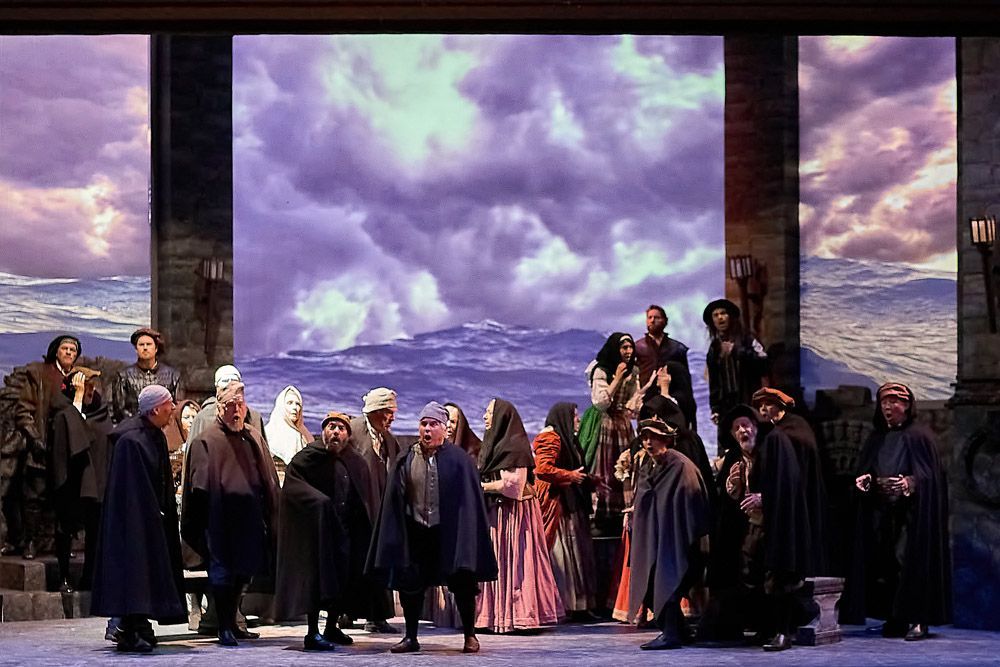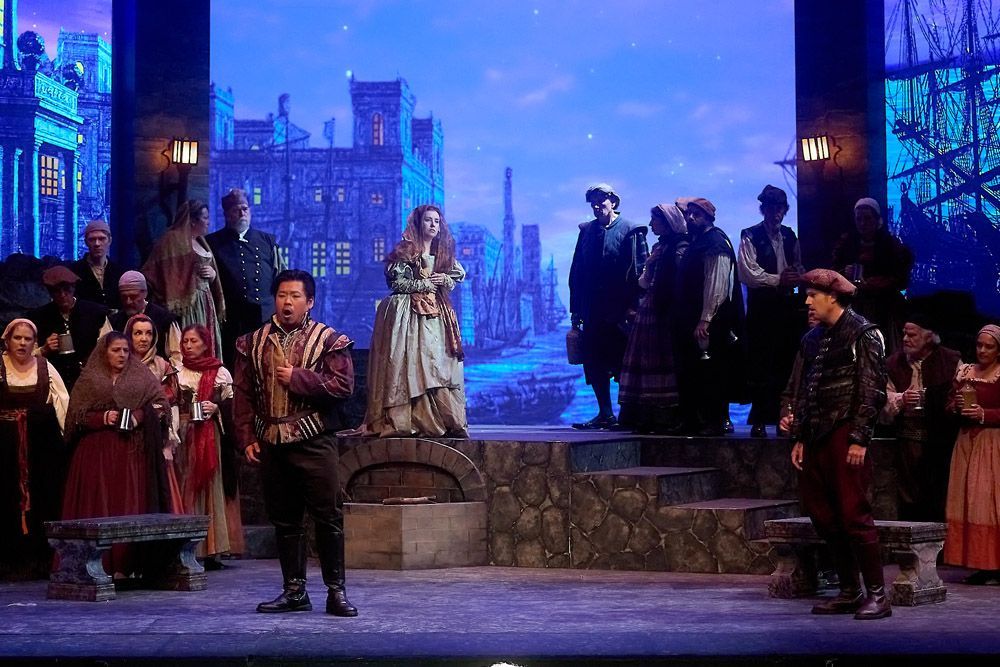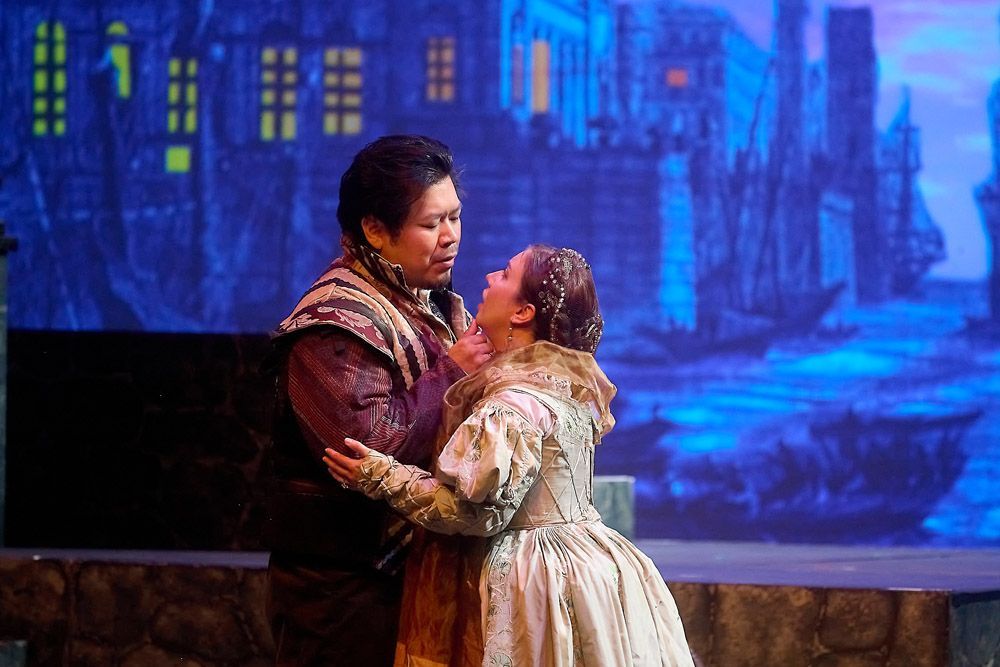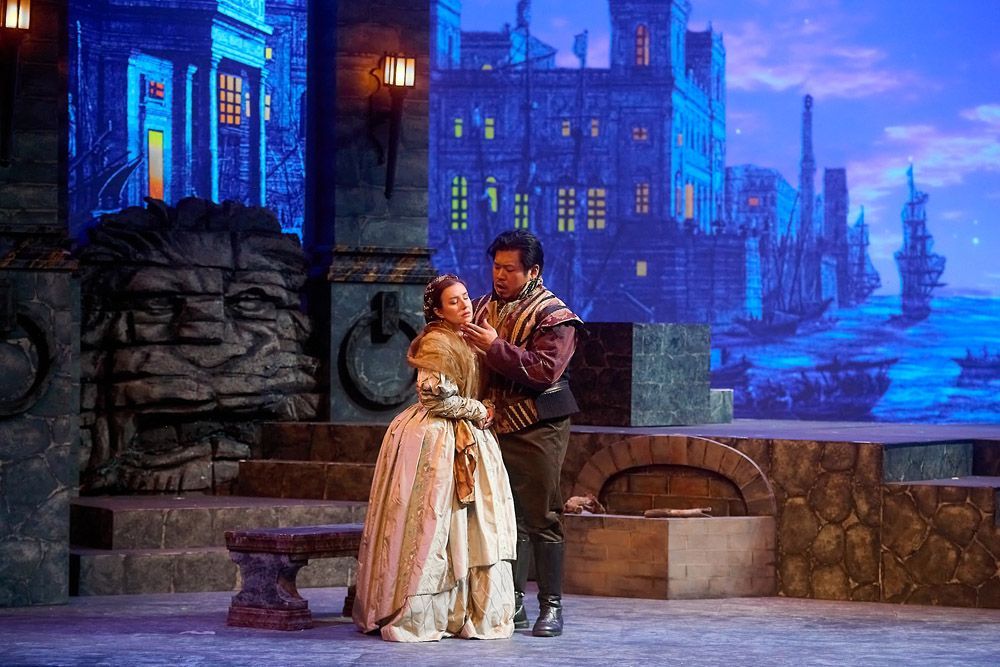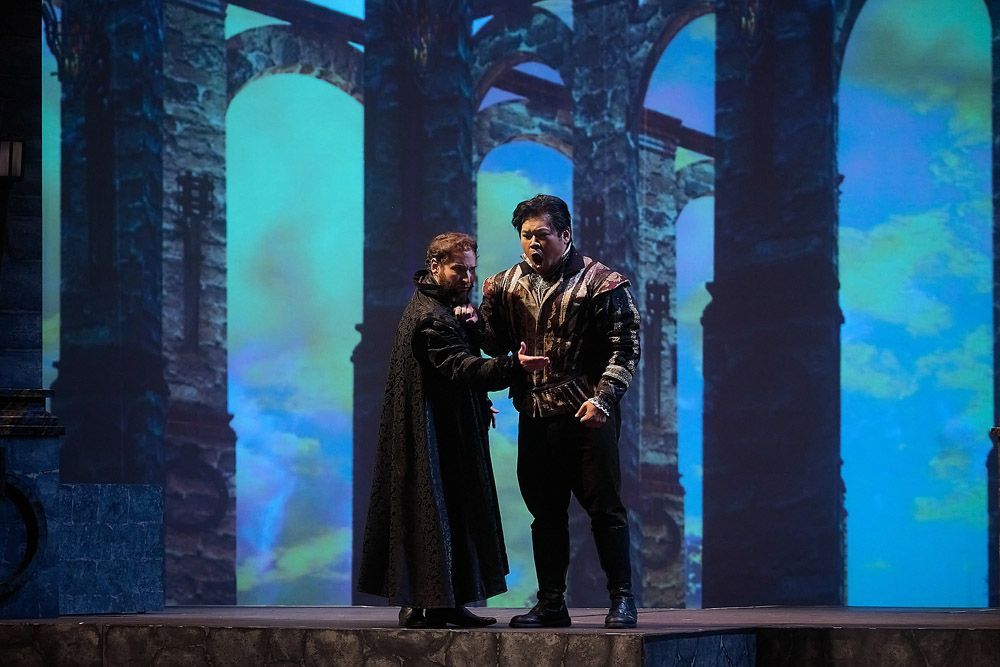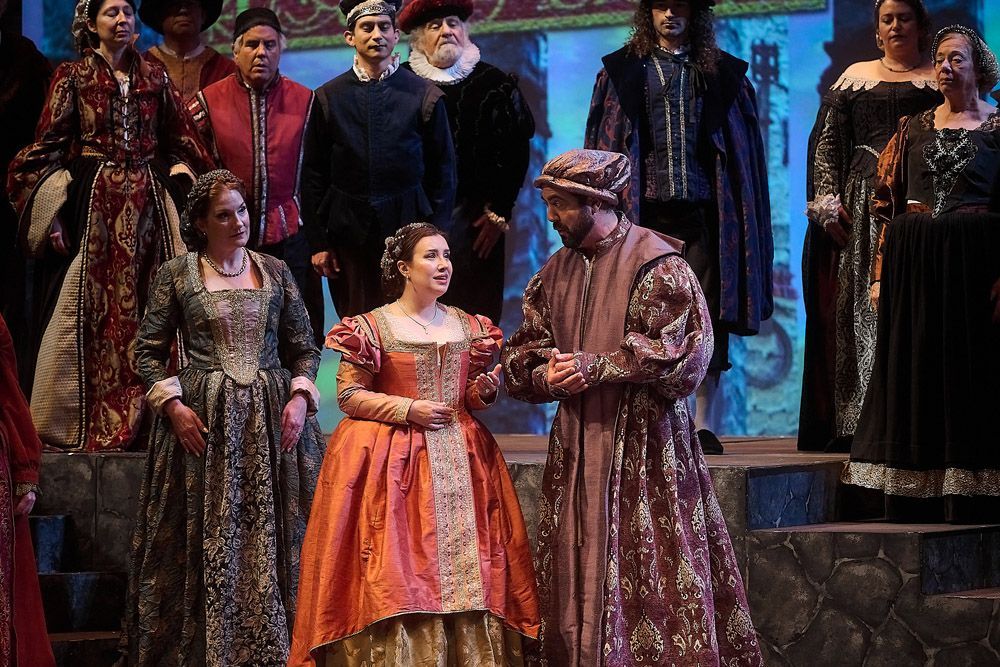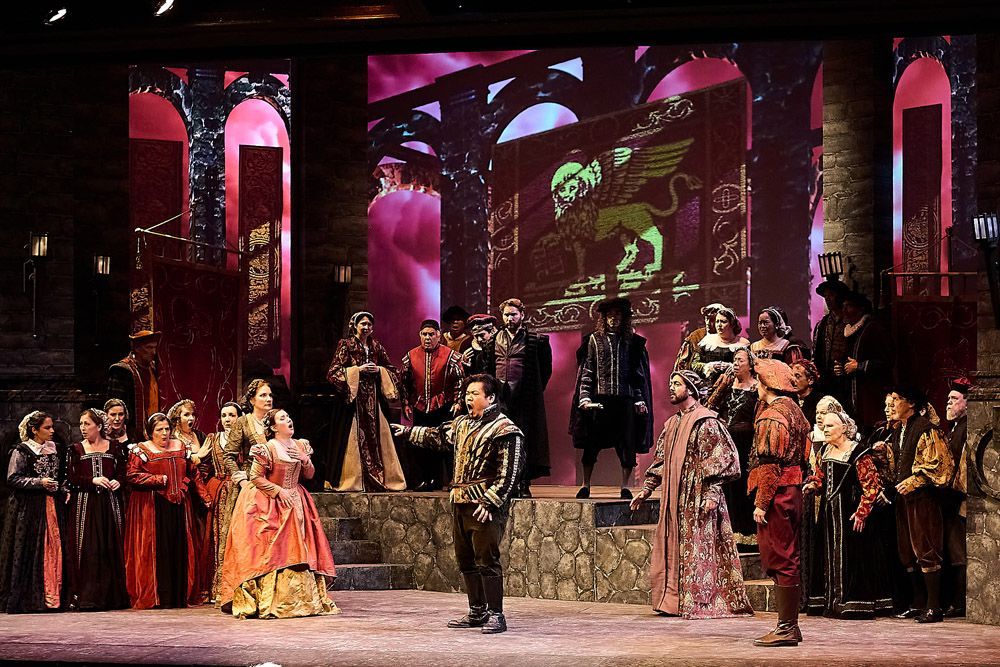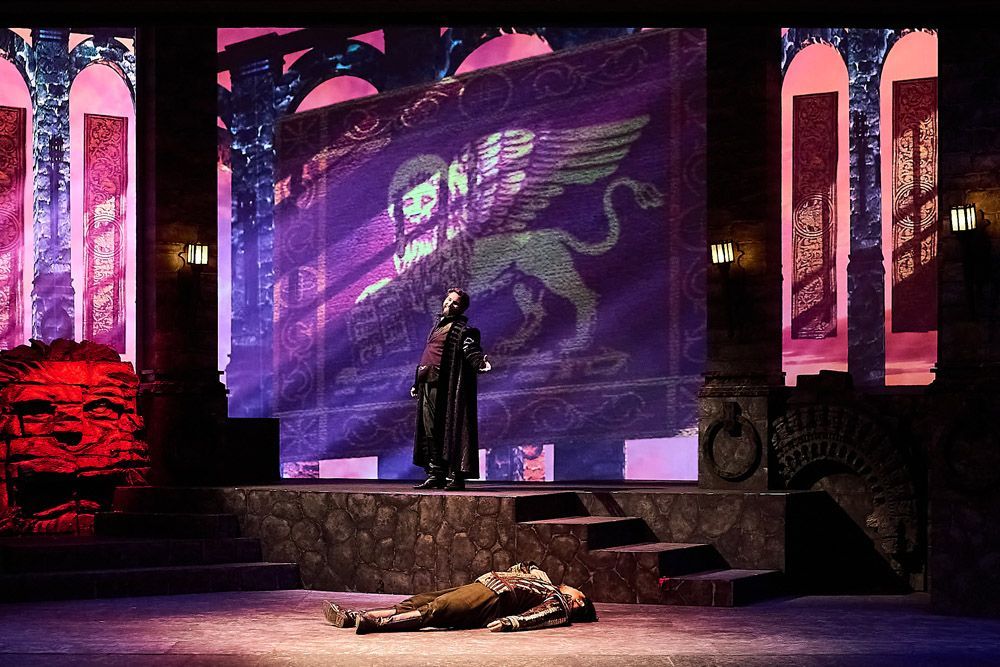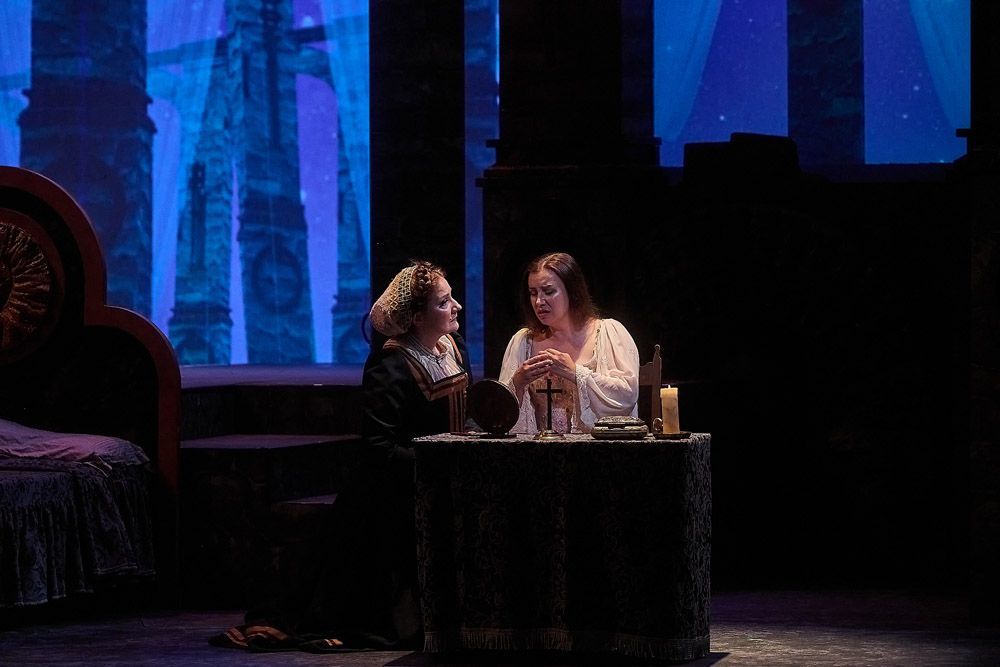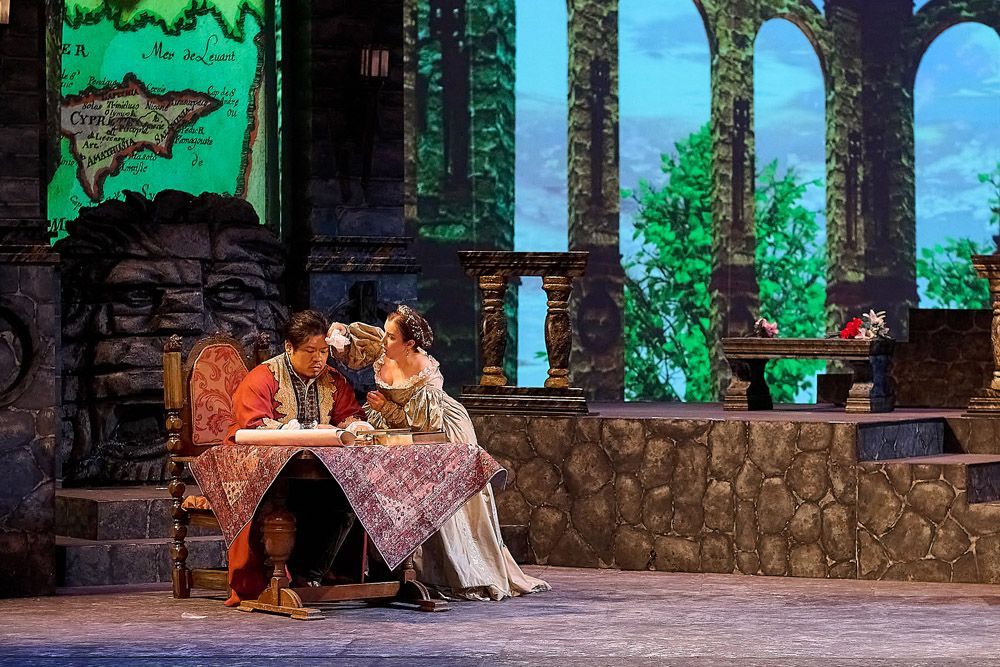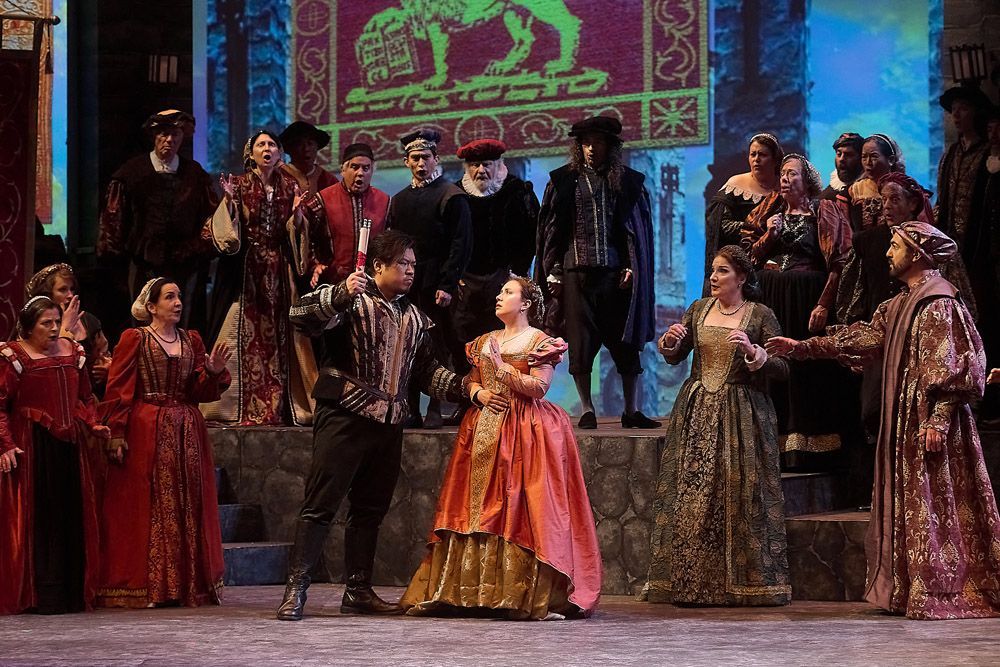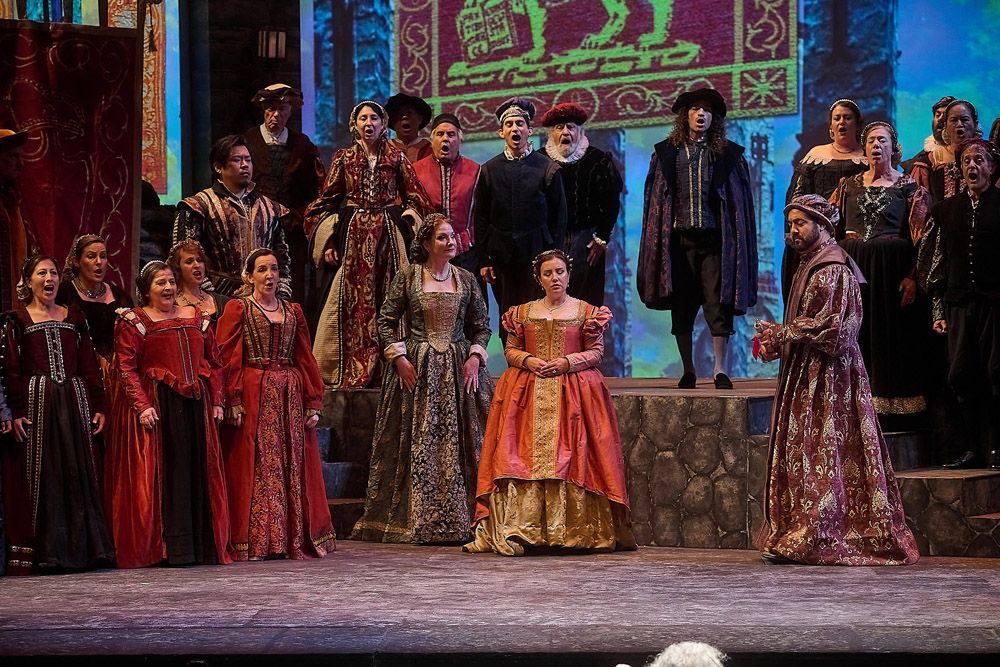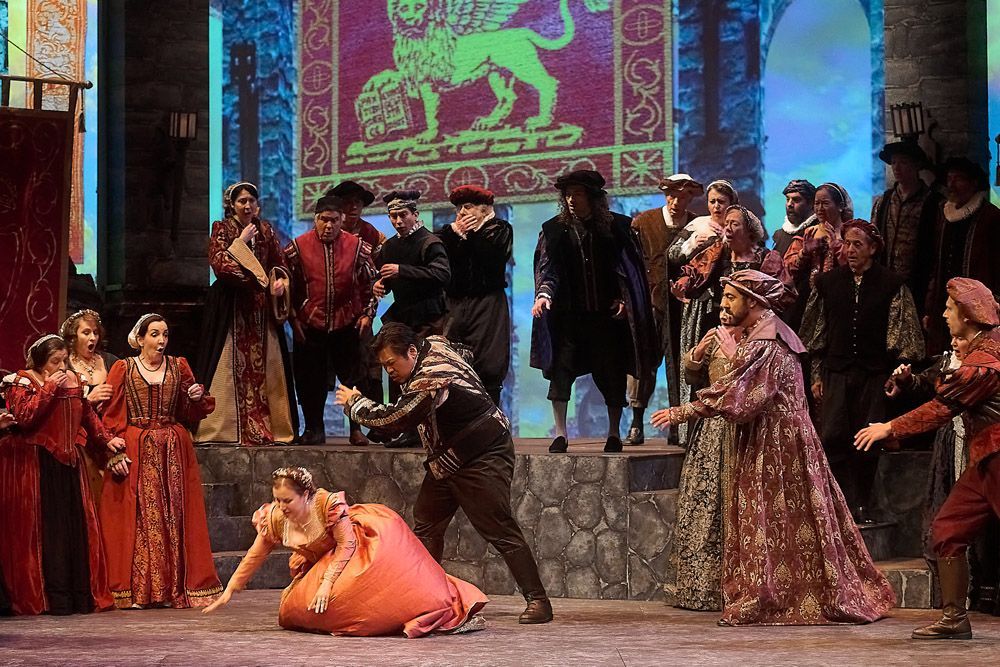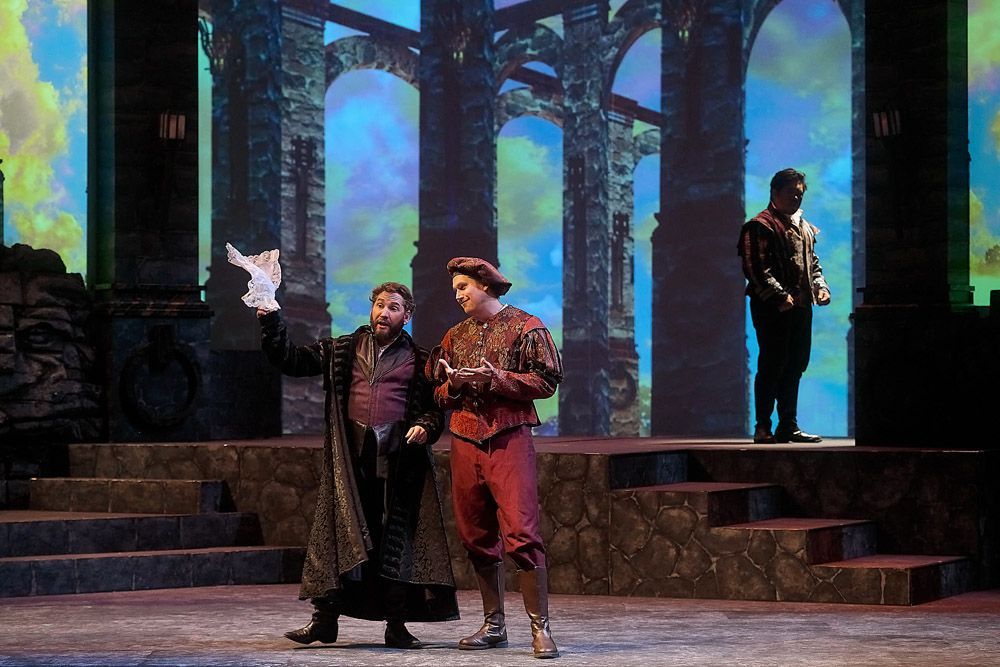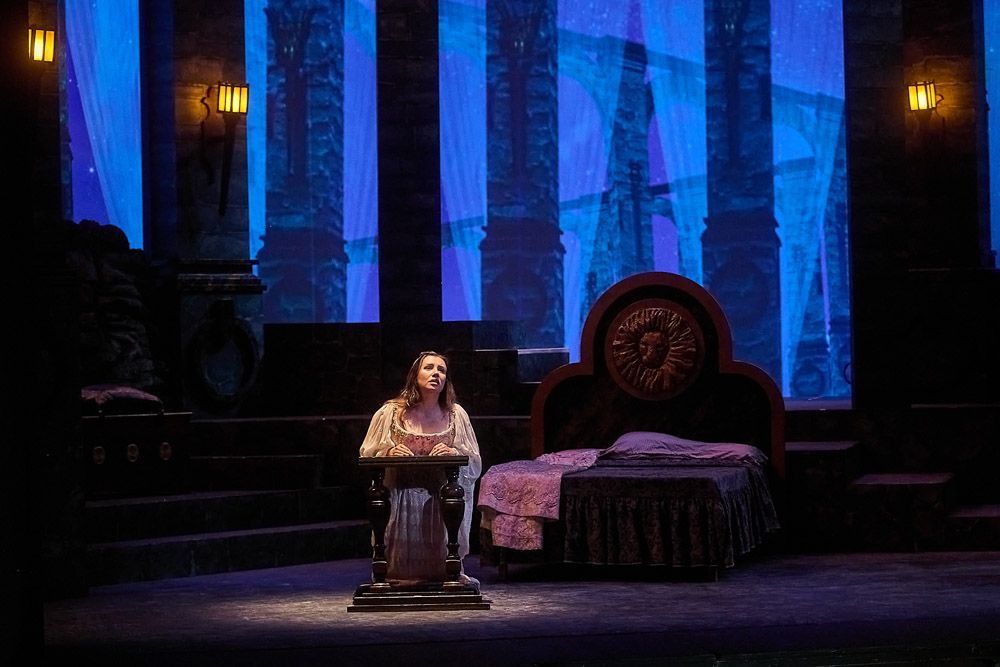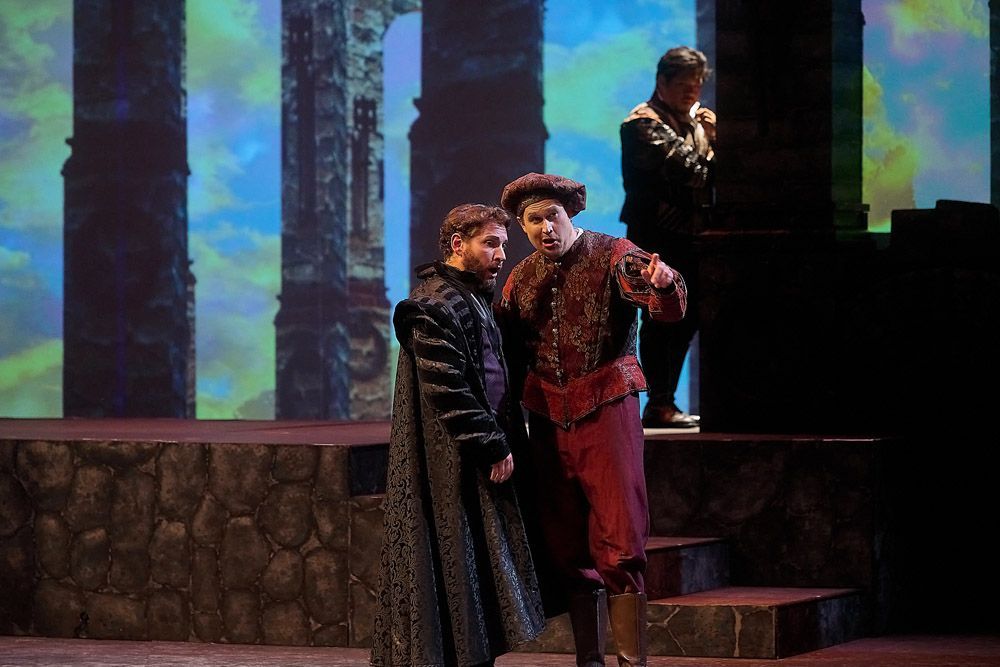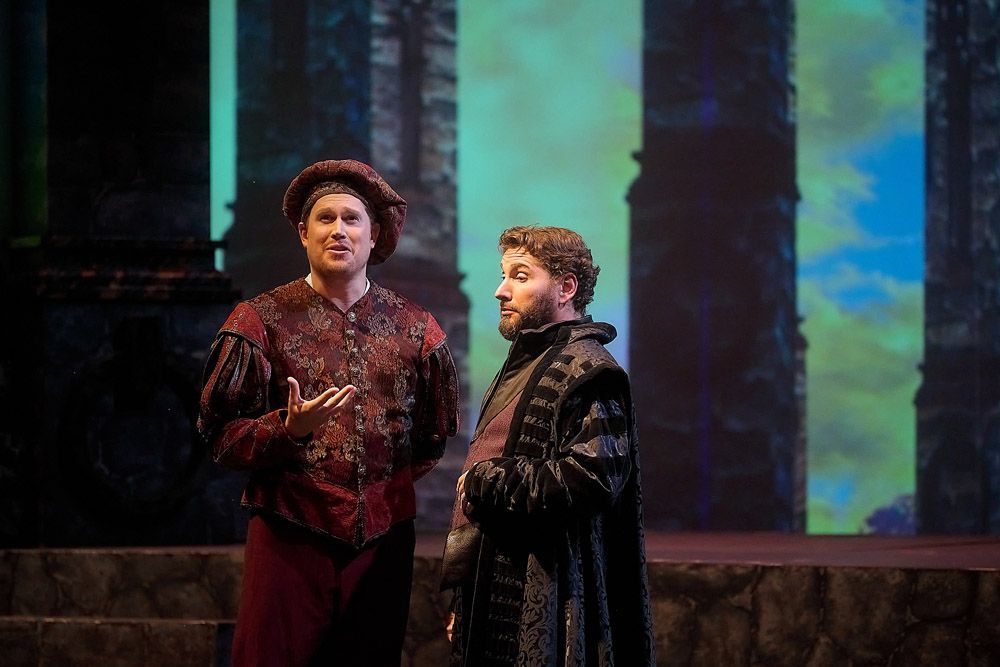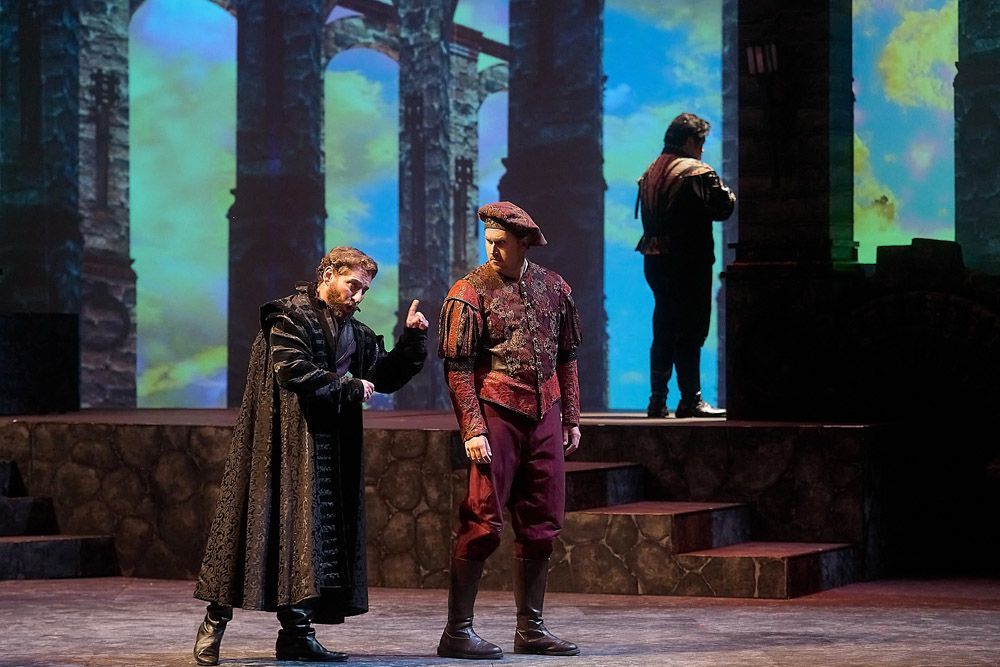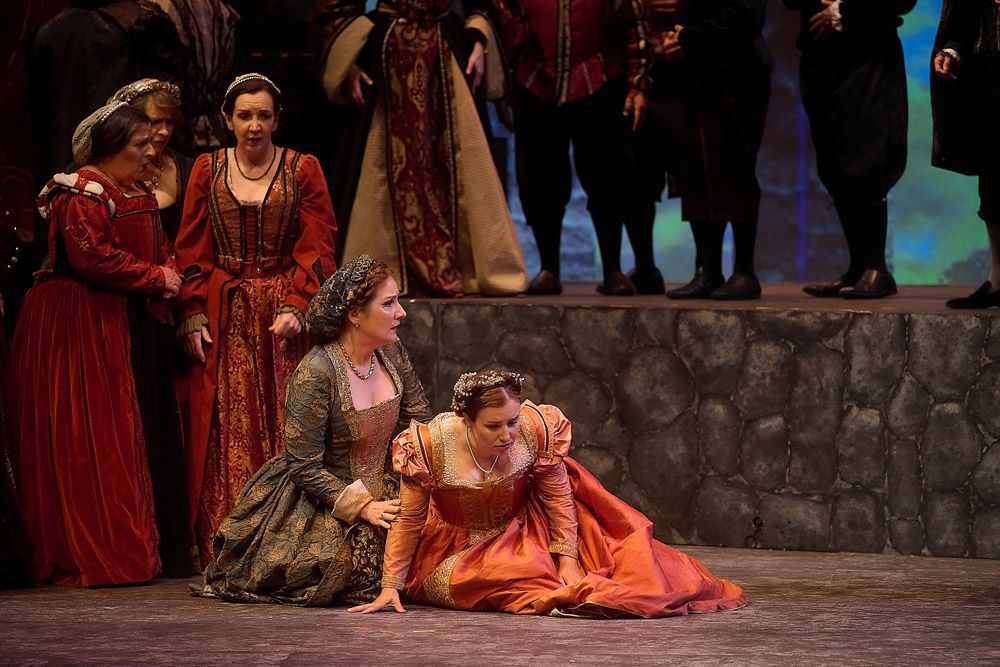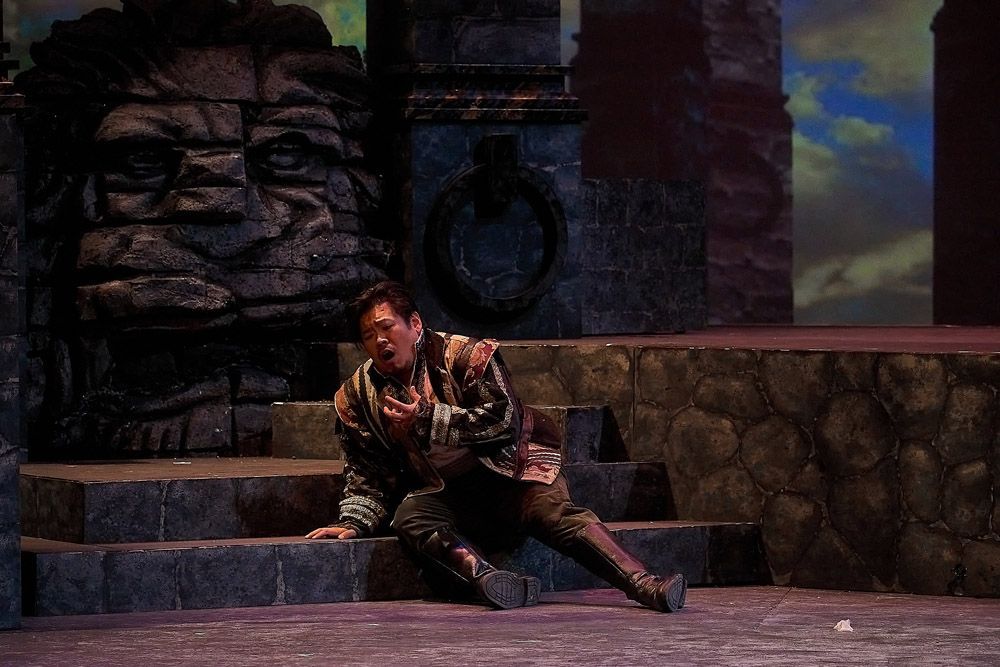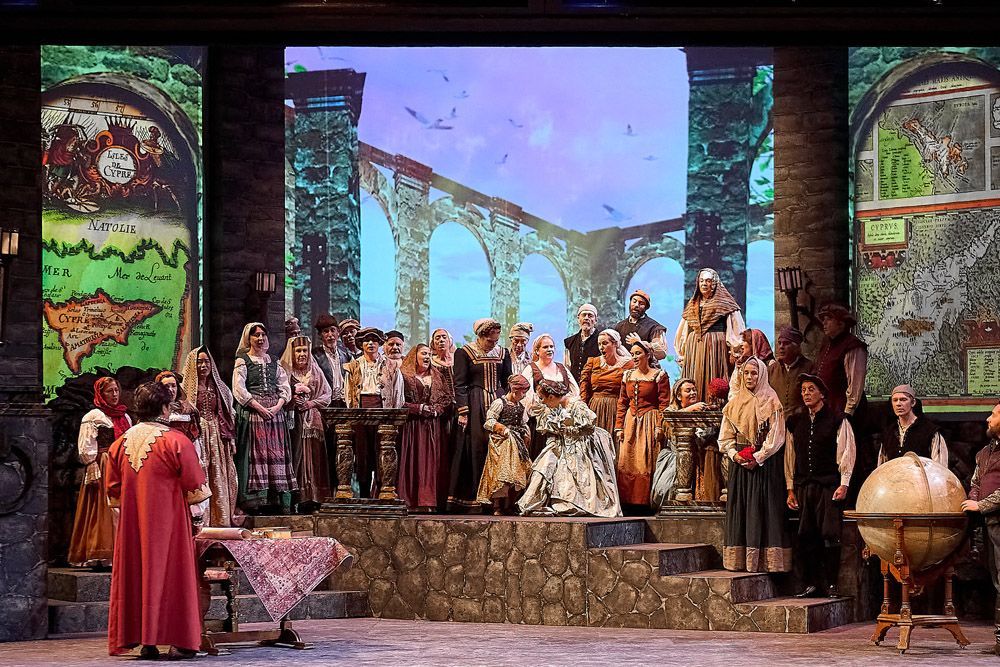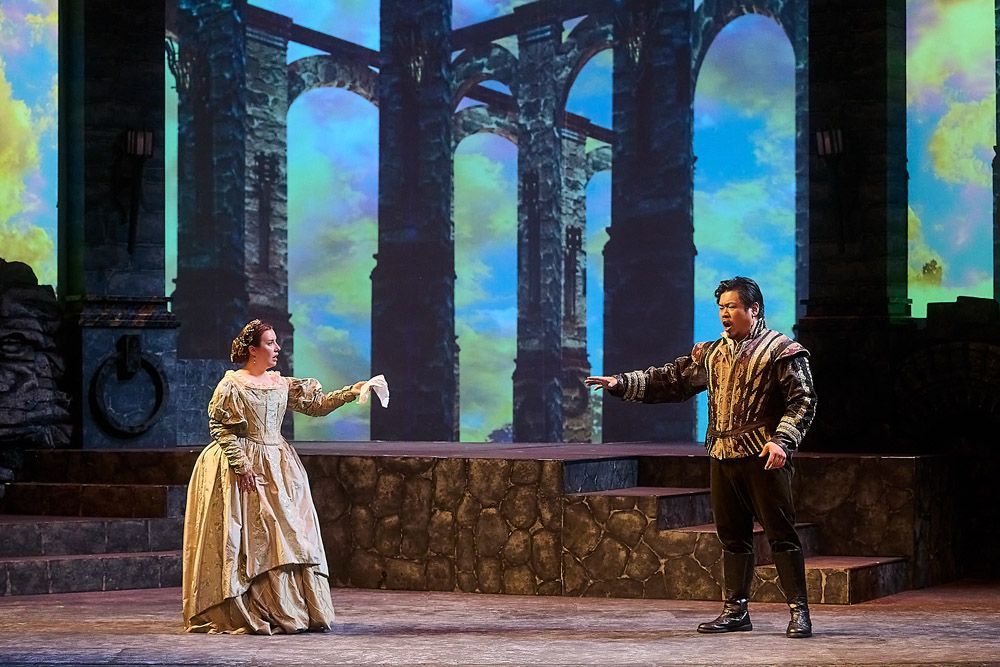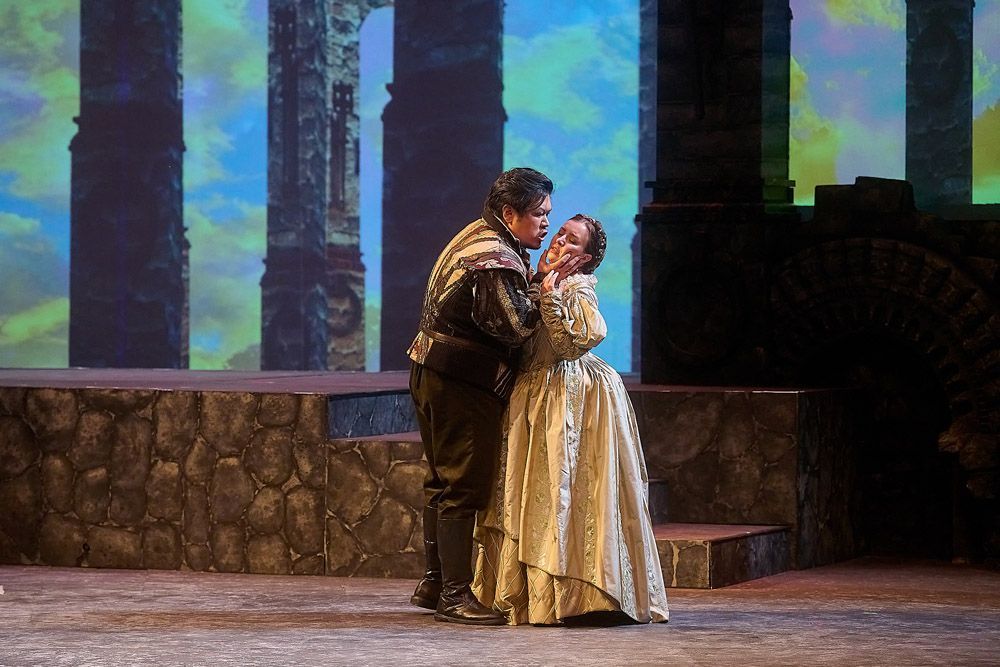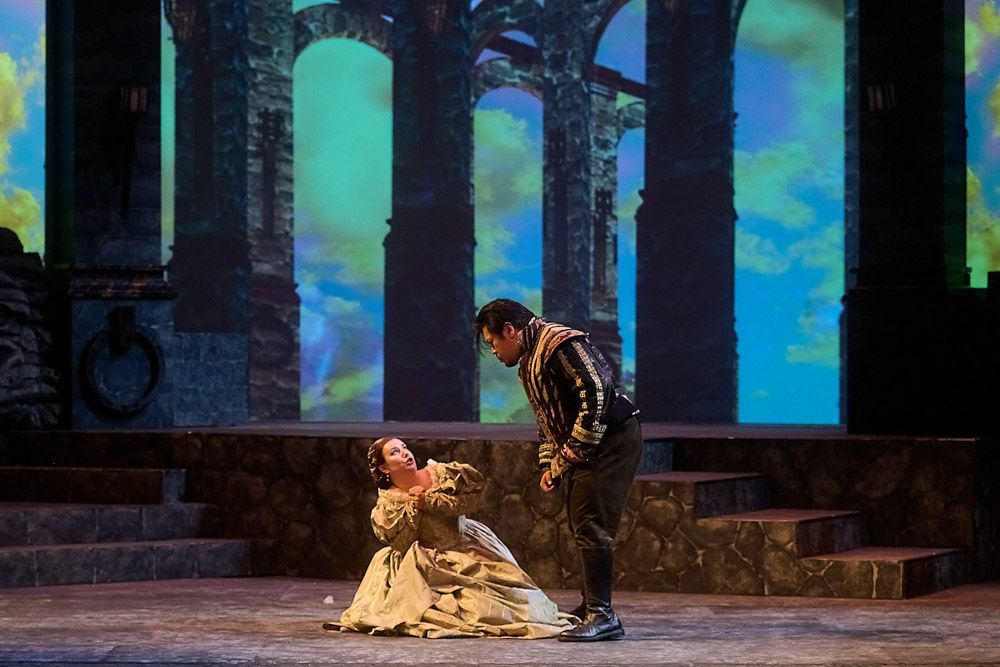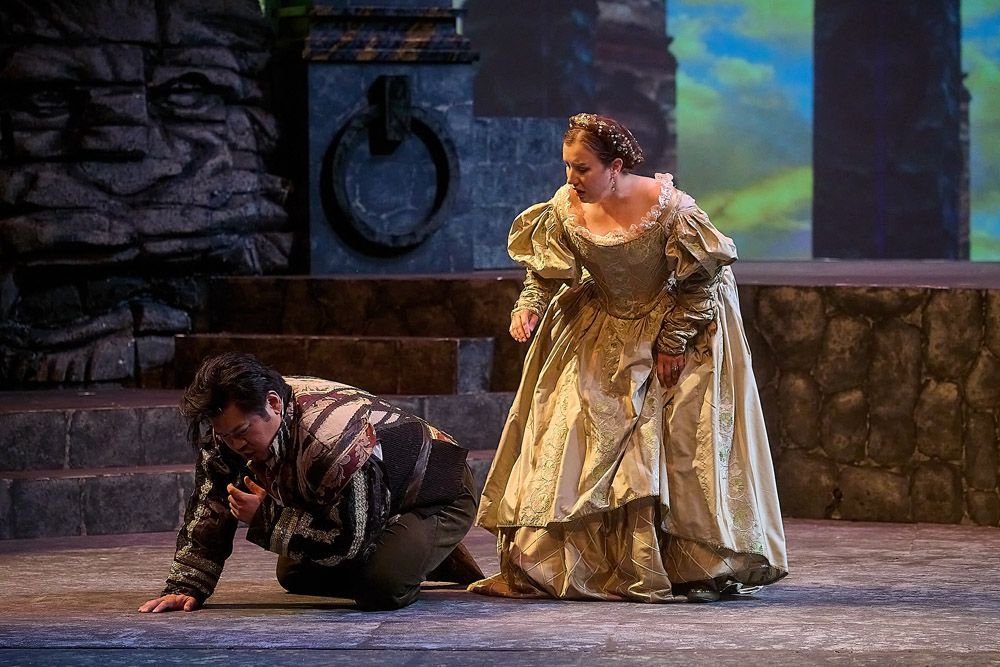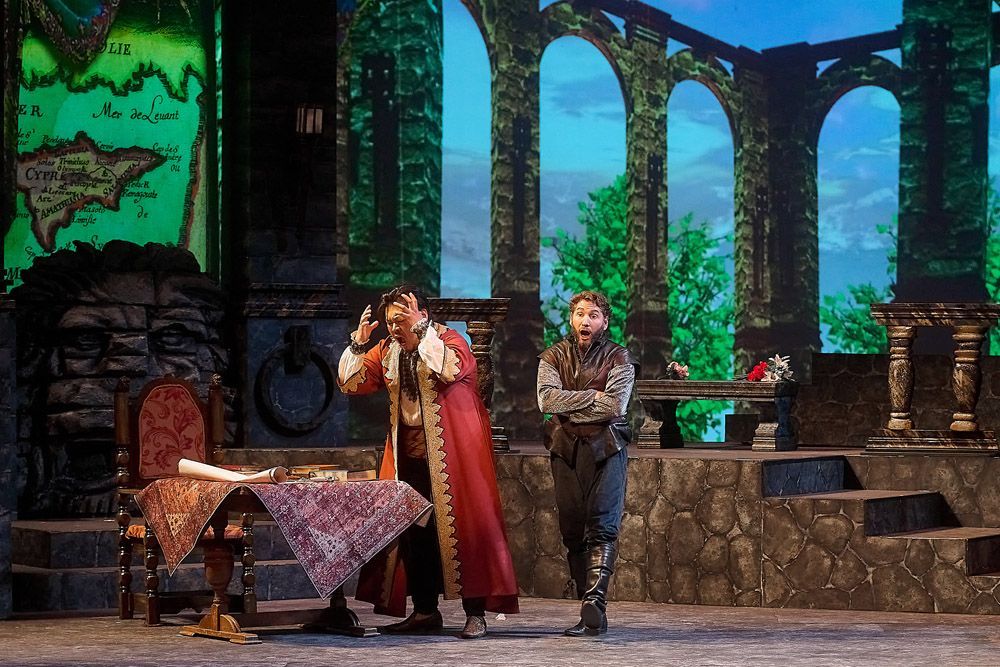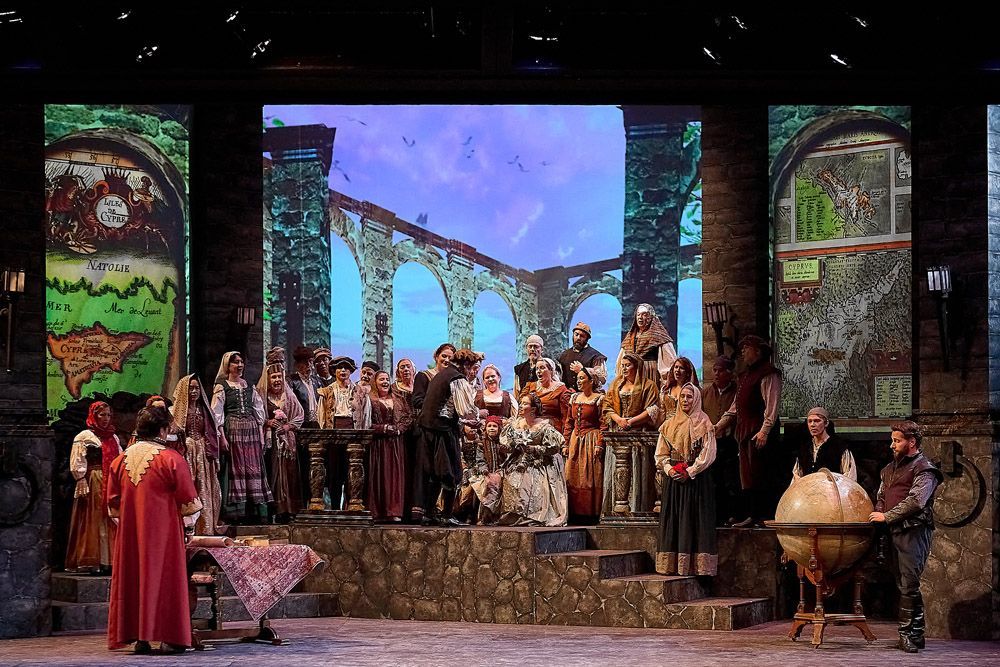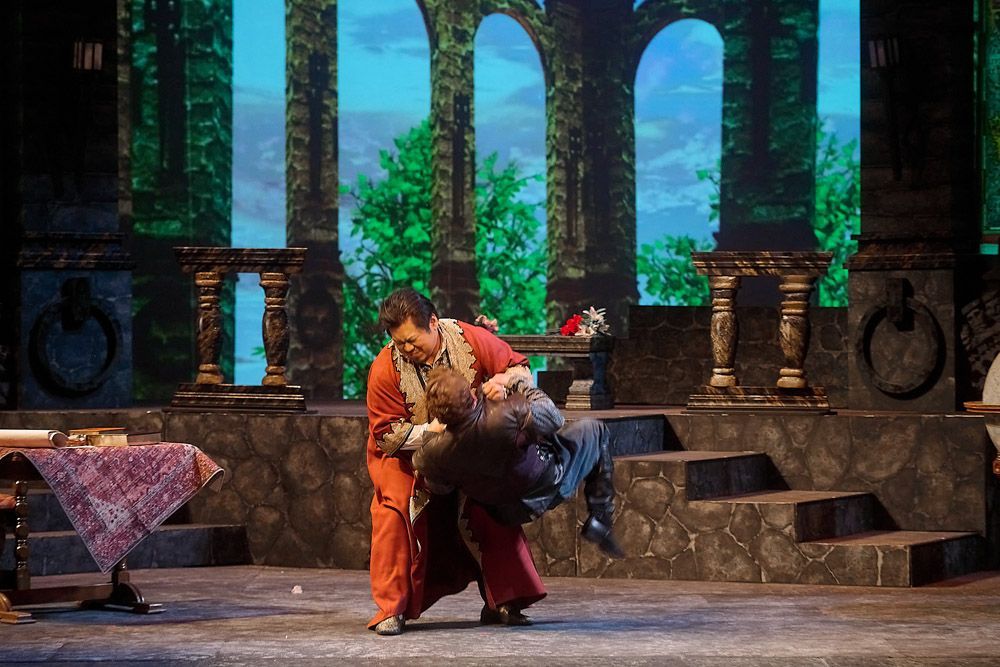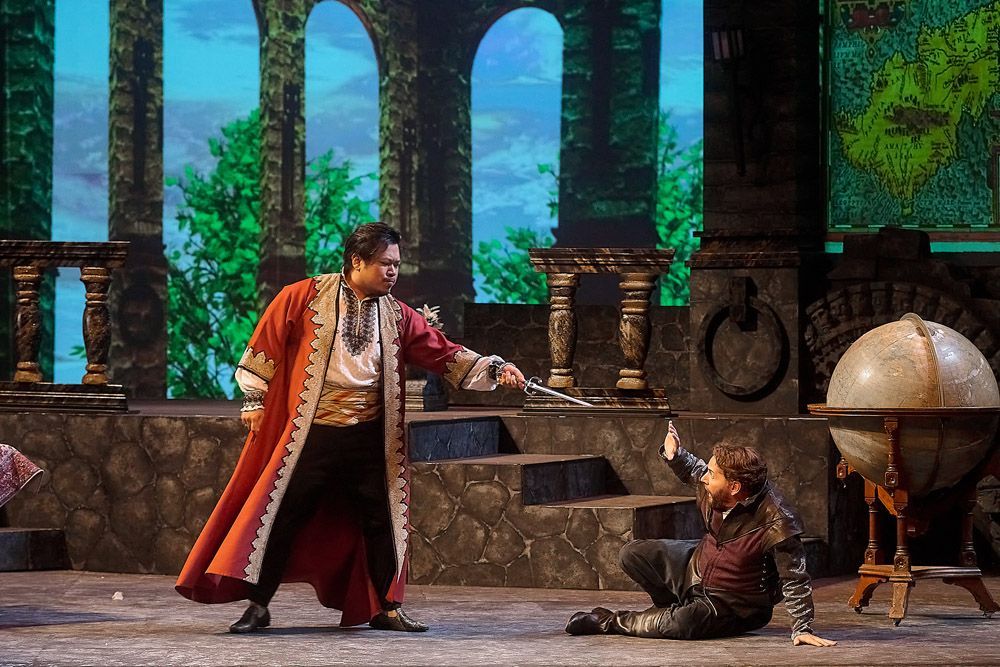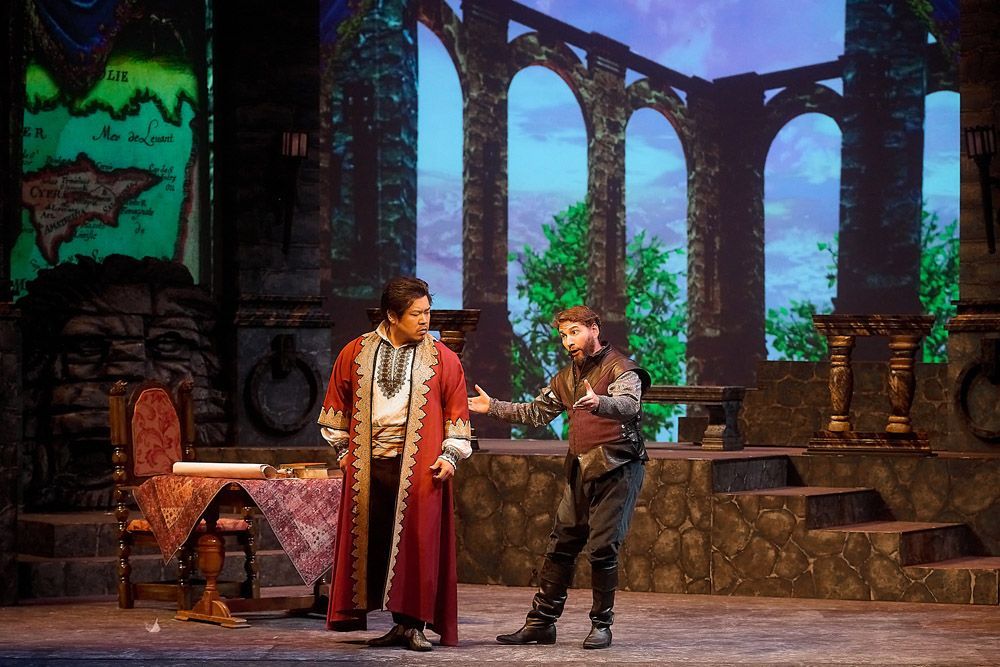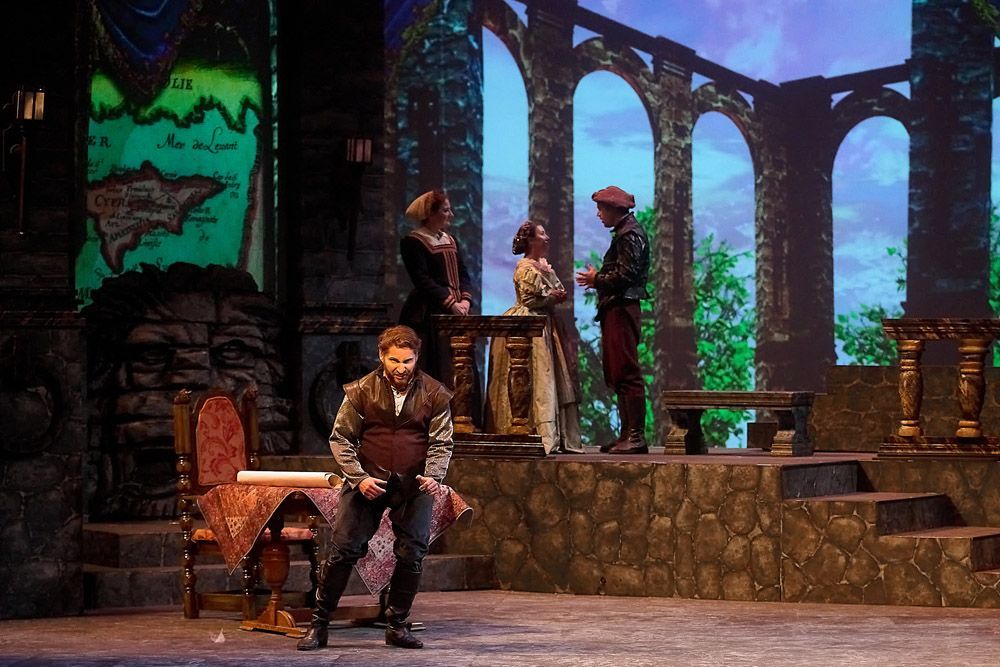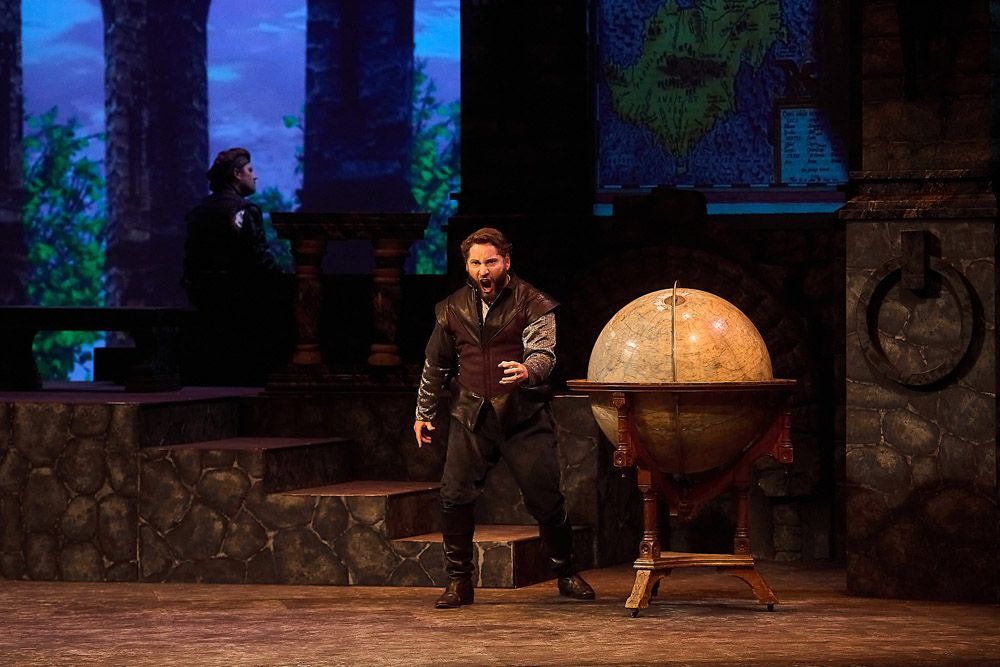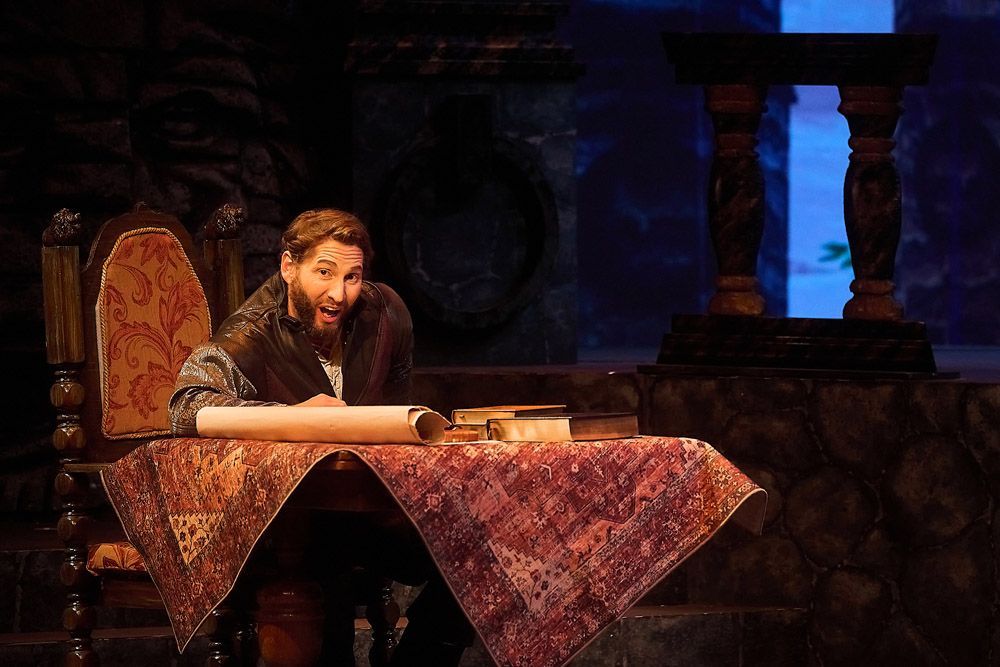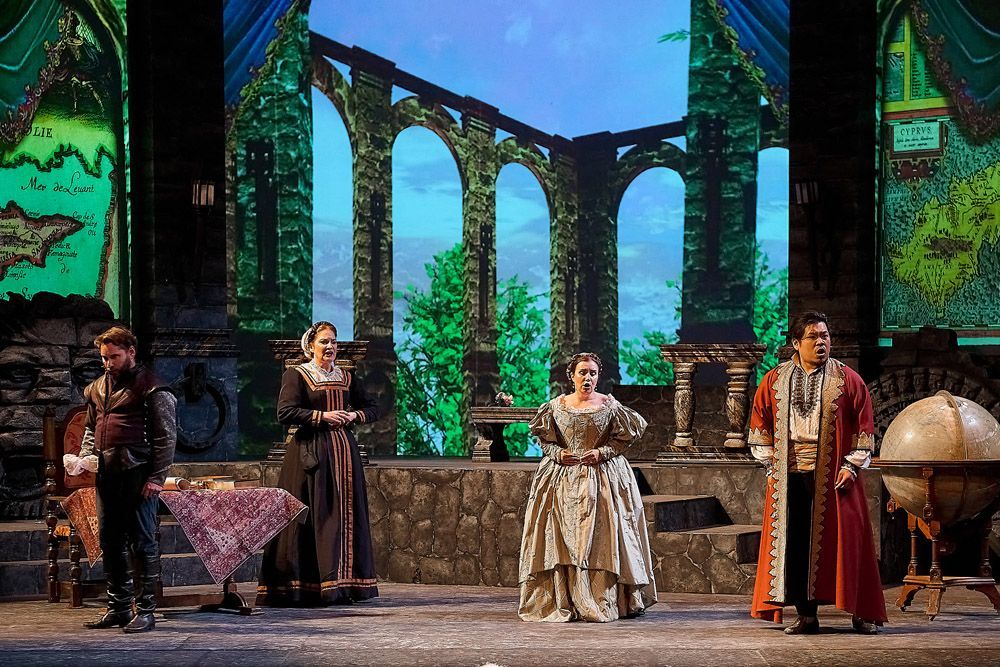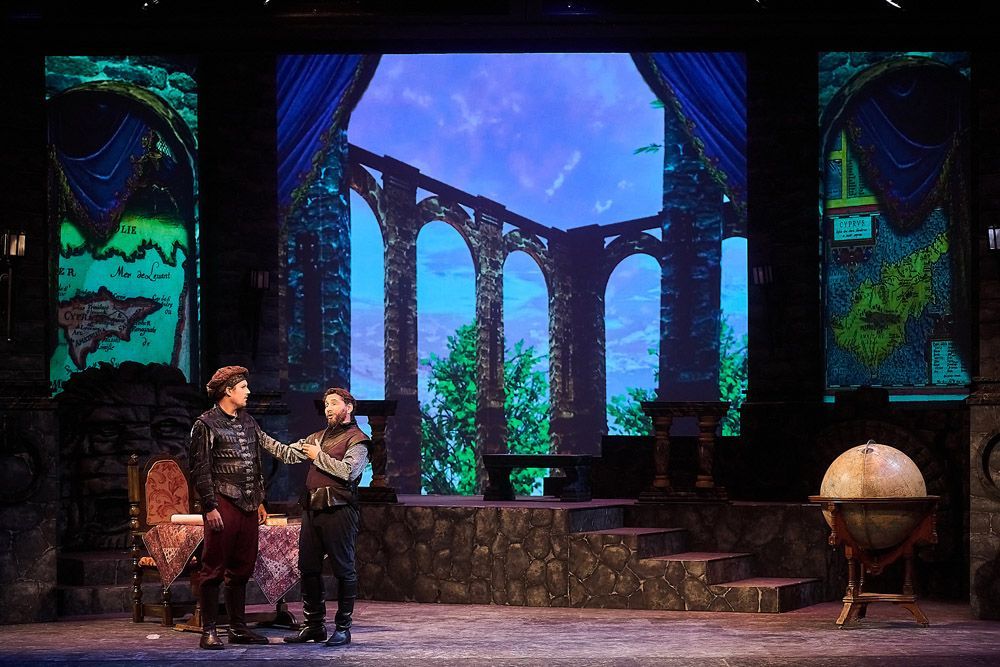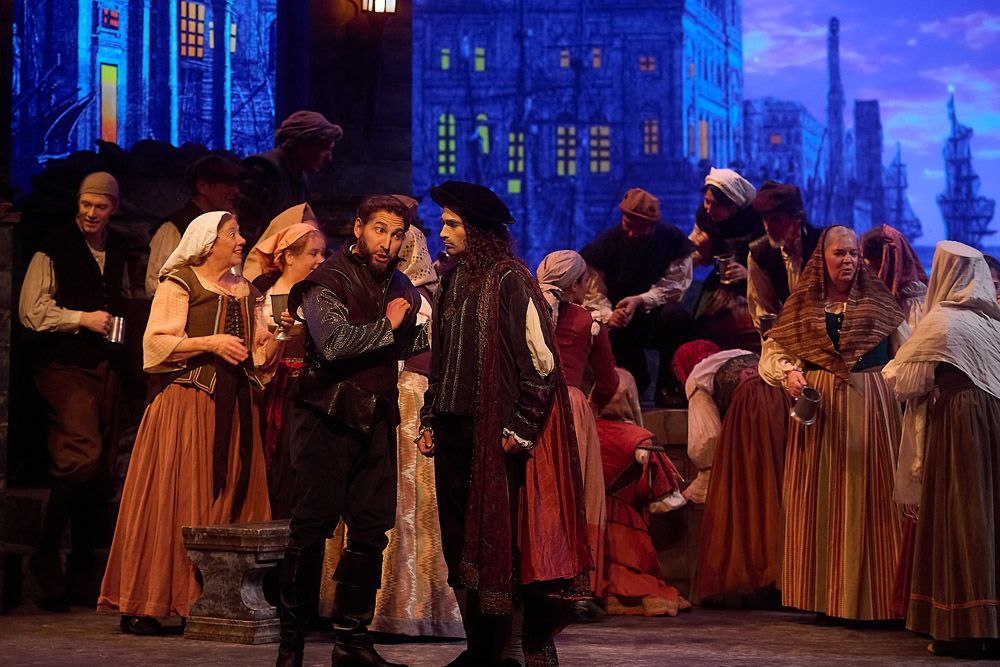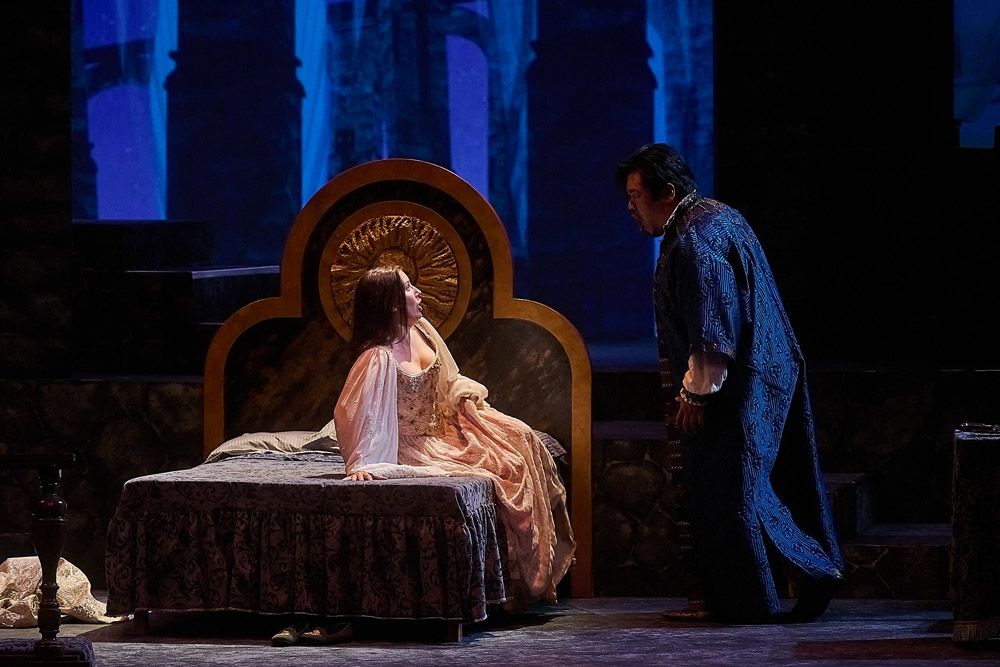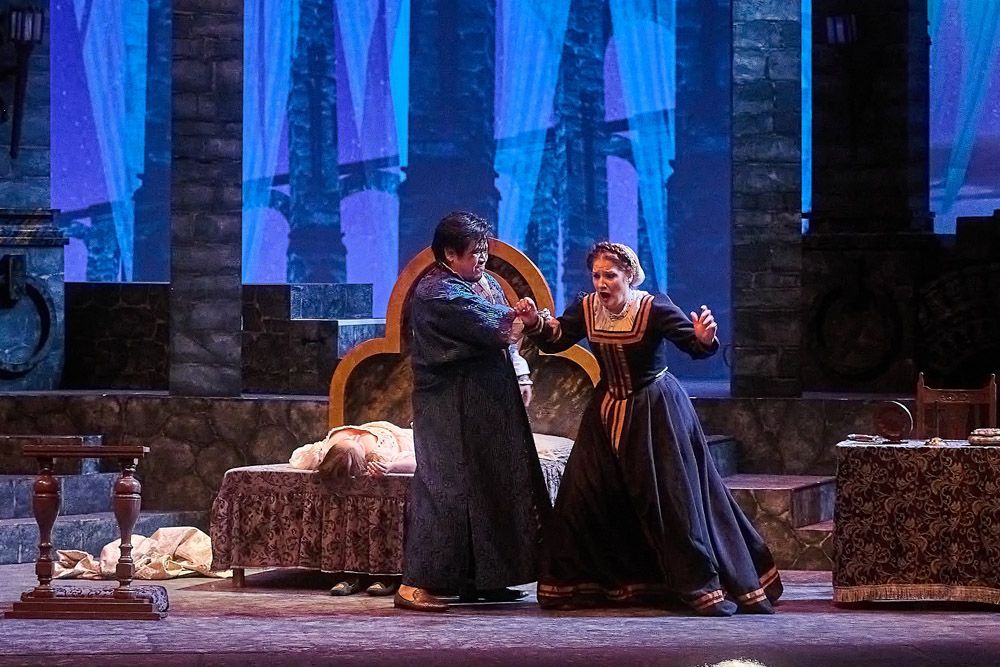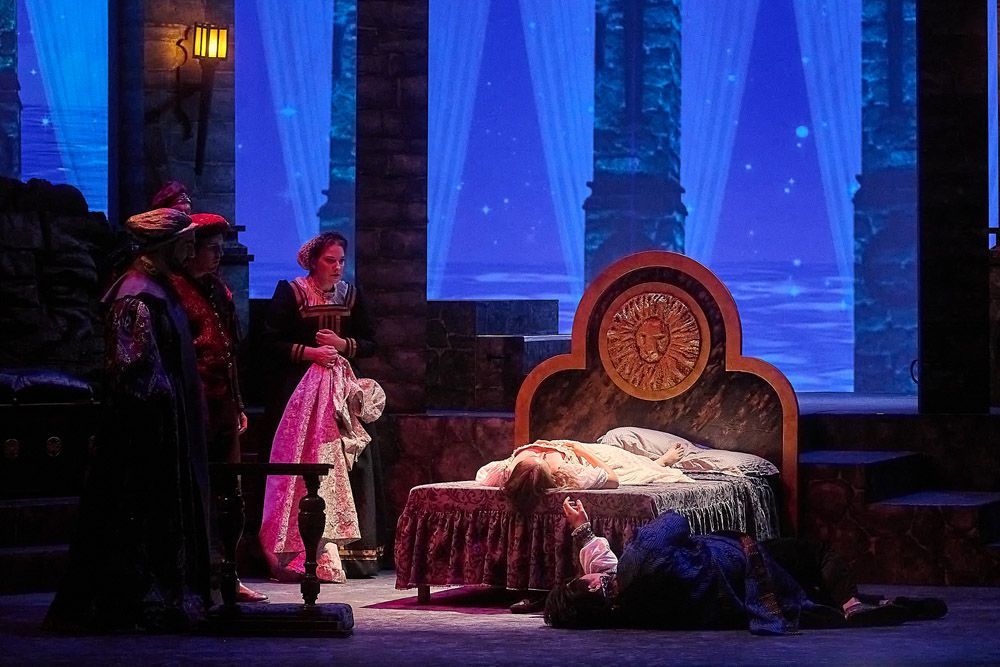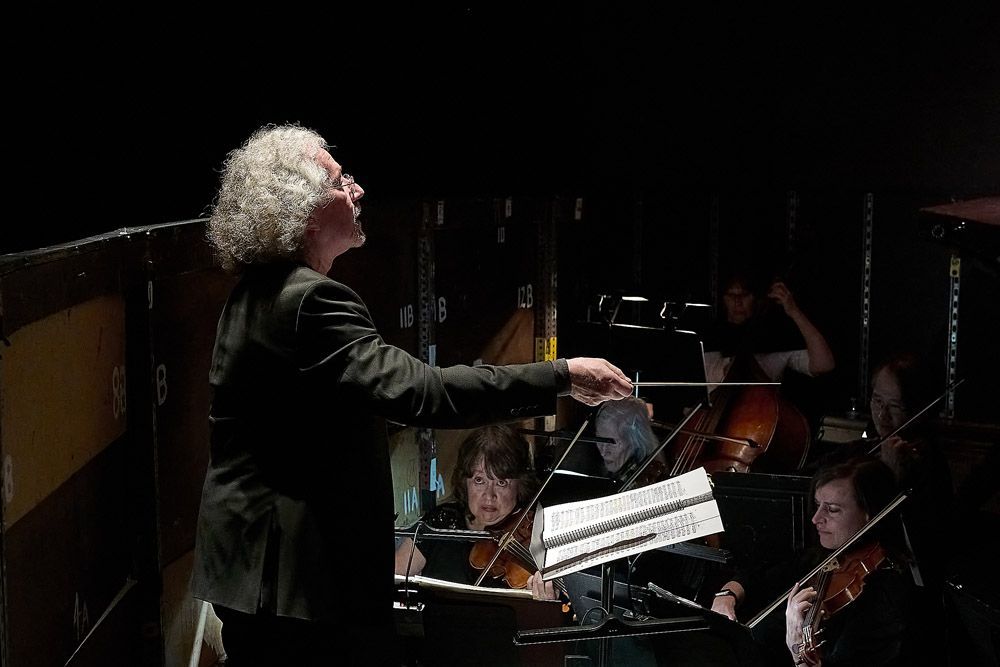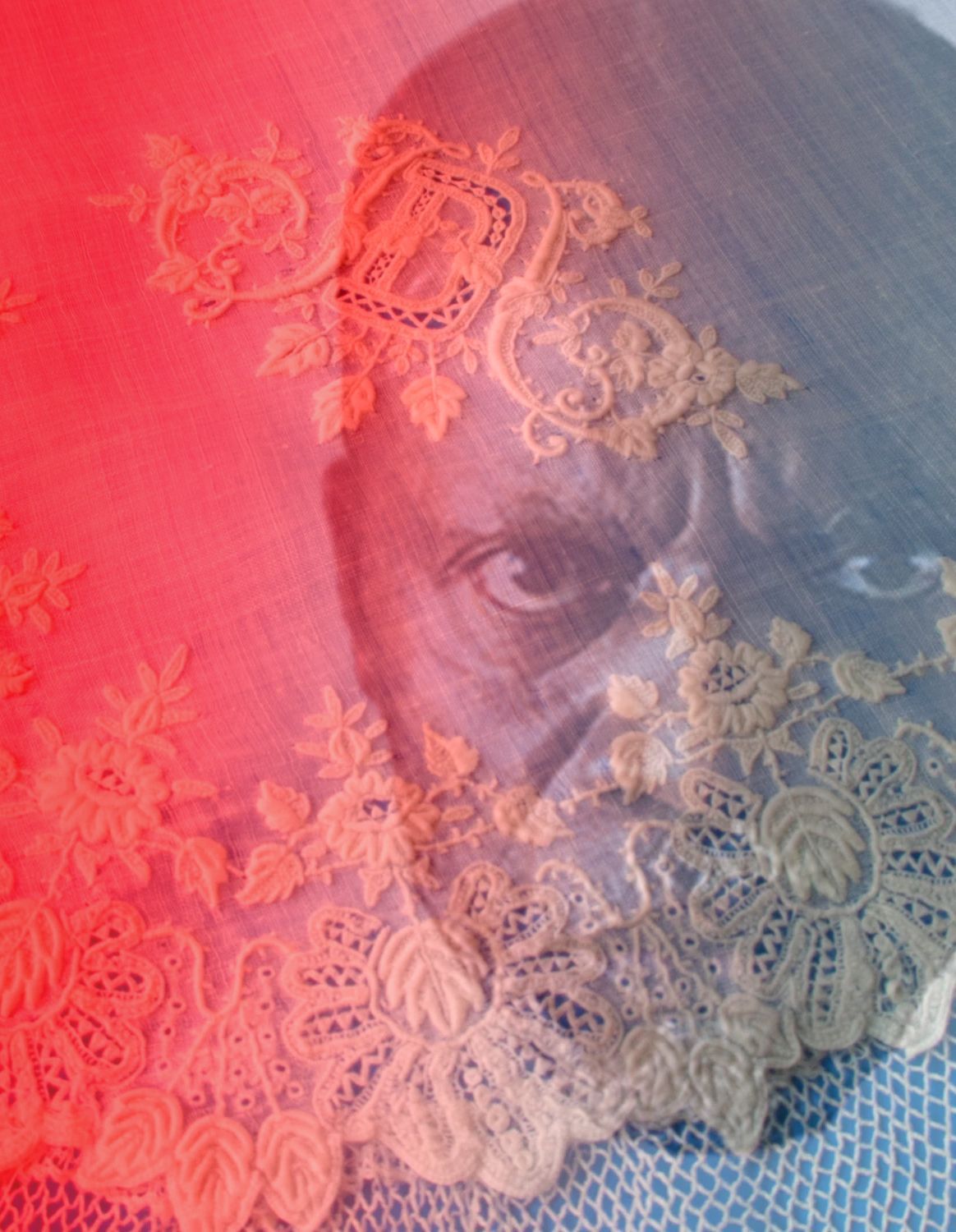
"perhaps one of the best offerings in the company’s long history of producing big-stage-worthy operas..."
Eddie Reynolds
Otello
Giuseppe Verdi
Libretto by Arrigo Boito
based on the Shakespeare's play Othello
Opera in four acts
In Italian with projected English titles
Friday, May 23 - 7 p.m.
Sunday, May 25 - 2 p.m.
Saturday, May 31 - 7 p.m.
Sunday, June 1 - 2 p.m.
at the Lucie Stern Theatre
1305 Middlefield Rd., Palo Alto, CA 94301
Performances are 3 hrs long, including 2 intermissions.
FREE Preview with Piano
Thursday, May 15, 2025 - 7:00 p.m.
at the
Holt Building
221 Lambert Ave, Palo Alto, CA 94306
Otello - 2025 - Media Gallery
PRODUCTION PHOTOS by Natalya Polyakova
About
Otello
World Premiere: Teatro alla Scala - Milan
WBO Premiere: Feb 14, 1969
Pictured: Interior view of the teatro alla Scala in Milan
Verdi all but retired after the success of his Aida in 1871. It took his publisher, Giulio Ricordi, his good friend the conductor Franco Faccio, the composer and librettist Arrigo Boito and his wife Giuseppina a decade to convince him to take on Otello. Chief among the factors contributing to his decision was his predilection for Shakespeare's works and the quality of Boito's proposed libretto.
Otello is a work of extraordinary dramatic power, and beauty. From the ravishingly sensuous love duet at the end of the first act, to the darkness of Otello's soliloquy as he descends into a murderous madness of jealousy, this score presents the legendary opera composer at his very best, surpassing the depth and breadth of his previous works and exploring new territory as if presaging Falstaff, the work that was to close his operatic composing career. As with Macbeth, Verdi manages to imbue Otello with an intensity that goes even beyond the original Shakespeare.
The story takes place in the late 16th Century in Cyprus, where Otello rules on behalf of the Venetian Republic. His lieutenant, Iago is secretly seething at having been passed up by Otello for the rank of Captain, which has gone to Cassio. He wants to ruin Otello. He first goads Cassio into a fight, which costs Cassio a demotion. Then he contrives a story of adultery involving Otello's devoted young wife, Desdemona, and Cassio. As Desdemona innocently intercedes on Cassio's behalf, she deepens Otello's suspicions. Iago gets his hands on a handkerchief belonging to Desdemona and, claiming to have found it in Cassio's room, convinces Otello that she is unfaithful. Otello ends up murdering Desdemona, only to find out from Iago's wife, Emilia, that the whole thing was Iago's fabrication. Grief stricken, Otello stabs himself and dies next to his beloved Desdemona.
Creative team
José Luis Moscovich - Conductor
Richard Harrell - Stage Director
Peter Crompton - Set Designer
Callie Floor - Costume Designer
Danielle Ferguson - Lighting Designer
David Gillam - Makeup and Wig Designer
Shirley Benson - Props Designer
Giselle Lee - Sound Designer
Pictured: set design by Peter Crompton
for the 2008 production of Der Fliegende Holländer
Cast
Otello - John Kun Park
Desdemona - Julia Behbudov
Iago - Robert Balonek
Cassio - Tom Mulder
Ludovico - Isaiah Musik-Ayala
Emilia - Laure de Marcellus
Roderigo - Carmello Tringali
Montano - Daniel Morris
Chorus
Bruce Olstad - Chorusmaster
Joanne Bogart - Chorus Manager
Dee Baily, Mark Baushke, Didier Benoit, Joanne Bogart, Richard Bogart, Yvonne Casillas, JoAnn Close, Cassidy Fink*, Inna Gitman, Michael Good, Barry Hayes, Lynne Haynes-Tucker, Sofia Kenny*, Jeffrey Lampert, Nina McBride, Stephen Miller*, Joanne Newman, Christopher Nichols, Lindarae Polaha, Philip Schwarz, Ashley Shannon, Jessica Shannon, David Simon, Miles Spielberg, Jo Taubert, Terra Terwilliger, Carmello Tringali, Timothy Tsang, Kim Van Tran
Orchestra
Kristina Anderson (concertmaster),
Violin I · Emily Chiet, Virginia Smedberg, Toshiya Nishi
Violin II · Lisa Zadek, Frida Pukhachevsky, Judy Kmetko, Julian R. Brown
Viola · Rebecca Gemmer, Thomas Elliot, Donny Lobree
Cello · Jamet Witharm, Catarina Ferreira, Thomas Shoebotham
Bass · Christy Crews
Flute · Michelle Caimoto - Vivian Boudreau
Oboe · Meave Cox
Clarinet - Stephen Zielinski
Bassoon · Amy Duxbury
Horn · Cathleen Torres, Diane Ryan
Trumpet · Richard Leder
Timpani · Don Baker
Percussion · Norman Peck
~
Orchestra Librarian · Virginia Smedberg
Orchestra Manager · Christy Crews
* First appearance with West Bay Opera
Otello 2025 - Press and Reviews
-
Read the review by Michael Anthonio in Parterre Box
Performance Review
Venetian blinding
West Bay Opera's Otello punches well above its weight
By Michael Anthonio
on June 03, 2025 at 9:00 AM
“Where there’s a will, there’s a way.”
That English proverb seems to be the modus operandi to many of the Bay Area’s small arts organizations, including West Bay Opera (WBO), a tiny opera company with the lofty ambition to provide “a taste of grand opera in the heart of Silicon Valley” at the intimate Palo Alto’s Lucie Stern Theatre. As “the oldest opera company in continuous operation in the West” (after San Francisco Opera), now in its 69th Season, WBO has also faced financial struggles that have forced the company to cut its productions to just two shows for the last two seasons. Nevertheless, the WBO’s promise of grand operas was spectacularly fulfilled with the current season’s closer, Giuseppe Verdi’s penultimate opera, Otello, which opened the last weekend in May and was seen on that Sunday’s matinee.
Otello has long been heralded as one of Verdi’s most significant achievements, as he and librettist Arrigo Boito transformed William Shakespeare’s tragedy into a different work of art of equal stature with soaring melodies and well-defined characterizations. Nevertheless, the work still proves to be quite a challenge even for large opera companies around the world, as the three leading roles are among Verdi’s most demanding both vocally and dramatically. Hence, any production of Otello becomes a significant event for the opera company that undertakes it.
For WBO, to pull out such an exceptional Otello was almost a miraculous feat, and that was mainly due to José Luis Moscovich, WBO’s General Director (for nearly two decades), and the conductor of the show. Moscovich led the 25-person orchestra in a reading that did the Maestro justice, bringing the glory and splendor of Verdi’s sweeping orchestration while being sensitive to his singers on stage. He chose a judicious pace that moved the story along, and he was particularly remarkable in building suspense, which is crucial for the terrifying Otello-Iago duet that closed Act II, and especially for the extended finale to Act III. In his hands, the orchestra sounded much larger than it actually was and time flew. Nevertheless, Moscovich allowed breathing space for the more intimate moments, such as the tender love duet in Act I and Desdemona’s “Ave Maria” in the final act.
In his program notes, Moscovich mentioned that “[r]everence for the composer’s and librettist’s vision is at the core of our approach.” Director Richard Harrell – a WBO veteran who directed many of WBO’s productions including the mesmerizing Bay Area premiere of I due Foscari six years ago – realized that approach beautifully, working closely with the production team, many of whom were WBO regulars as well.
Peter Crompton converted Lucie Stern’s small stage into a two-tier, static stage, adorned with stone columns, which was appropriate for the Cyprus location. In a rather amusing move, he included a sculpture of a lion’s head with an open mouth à la Bocca della Verità/The Mouth of Truth. The two-tier approach was practical in giving the stage depth, particularly in Act II, which required a castle’s hall and a terrace. Crompton also collaborated with Frédéric O. Boulay on the many excellent projections that transported the sets into Cyprus at nighttime and denoted the arrival of Lodovico, the Venetian ambassador, with flags bearing the Lion of Venice!
Shirley Benson provided the cast with the apt props called for in the libretto, while Callie Floor dressed everybody on stage in fitting costumes for the times. Daniele Ferguson lit the stage with soft lighting, gorgeously defining day and night, combined with streetlights on those stone columns that were rather temperamental (and noisy) on that matinee show. Ferguson also used strobe lights from the back of the hall for the storm scene at the beginning of Act I, which I wish that WBO had posted a warning about, as I saw a lady in front of me cover her eyes to avoid seeing it.
Personally, Harrell’s greatest strength was in directing the movements of everyone on stage, both the principals and the chorus members. This was clearly not a “park and bark” show; neither was this a case where the principals were wandering aimlessly while singing their parts. There was a heightened sense of naturalness in the movements, aided by the principals’ excellent acting. His direction of the extended finale of Act III was specifically exceptional, as one by one, everybody entered the picture as if in a tableau, culminating in the moment when Otello threw Desdemona to the ground, and all eyes were on her!
Moscovich chose a competent group of soloists to bring out the drama in Otello. In the title role, Korean-American tenor John Kun Park sang earnestly, powerfully demonstrating the downward trajectory of the short-tempered antihero. While his voice might lack the ringing top that I came to expect from the role, particularly in the first Act, he subsequently sounded angrier and more unhinged as the story progressed. His duet with Iago, “Sì, pel ciel marmoreo guiro,” was marked with terrifying force, and his scene at the end of Act III was almost too hard to watch.
Even more successful was soprano Julia Behbudov, who made her WBO debut as Desdemona. A full voice with a glorious top, Behbudov brought colors and nuances to her take, similarly showing the downward progression from a happy (and almost naïve) bride to a confused, misery-laden victim. Her renditions of “Willow Song” and “Ave Maria” were especially heart-wrenching in their delivery, as if all the happiness had been completely voided from her voice.
All the minor roles were handled handsomely. Tom Mulder began rather tentatively as Cassio, but he quickly found his footing and presented a charming Cassio. Laure de Marcellus sounded adequately defiant in Emilia’s too-little-too-late final scene, while Isaiah Musik-Ayala and Carmello Tringali respectively made a noble Lodovico and a cunning Roderigo. Daniel Morris, the fight coach for the production, turned in as a last-minute replacement for James Cowing to sing Montano, and he made his presence felt. Bruce Olstad’s 28-person choir rounded out the cast with their significant contributions as the Cypriots, soldiers, and sailors.
To my ears, the show belonged to bass-baritone Robert Balonek, who fully embodied the treacherous Iago almost to the extreme. With a deep, robust, booming voice and an ease of delivery, Balonek turned a diabolical Iago who stole the show every time he was on stage. Balonek utilized marked dynamics and nuanced colors to maximize the impact of each phrase. He was quite a stage animal, too, using every single body language and gesture in the book to deliver the punches. In his hands, Iago came alive, not just as pure evil, but also as a master manipulator and controller, doing justice to Shakespeare’s greatest villain. It was truly a tour-de-force performance that was truly transfixing to watch!
Otello was undoubtedly a resounding success for WBO, and it was astonishing to see the level of passion and dedication of everybody involved. Next season, WBO is celebrating its 70th anniversary with a truly ambitious program, a trio (yes, they’re back) of Camille Saint-Saëns’s Samson et Dalila, Richard Strauss’s Salome, and Giacomo Puccini’s Tosca! I can’t wait to see what they have in store! Who says grand opera is dead in Silicon Valley?
https://parterre.com/2025/06/03/venetian-blinding/
-
Read the review by Michael Vaughn in the Almanac/Palo Alto Weekly
Review: Villain takes center stage in West Bay Opera’s ‘Otello’
West Bay Opera presents Verdi’s late-life masterpiece as an intimate tale
Avatar photo
by Michael J. Vaughn
May 29, 2025 11:28 am
It’s amazing to witness, year after year, the willingness of Jose Luis Moscovich and company to take on some of the more daunting operas in the canon. In this one — one of the greatest — they have exceeded all expectations, creating a riveting production of Verdi’s late-life masterpiece.
Stage director Richard Harrell’s interpretation brings out the idea that, although Otello is usually presented in the grand style, the basic storyline is fairly intimate. Not that there aren’t epic moments. The opening scene has an impressive number of villagers packed onstage, watching the great Moorish admiral navigate a deadly storm to bring his troops home from a victory over the Turks. Bruce Olstad’s chorus does a fine job of reaction acting (the ship floundering somewhere near the 20th row), and goes on to give a robust presence to Verdi’s chorus-heavy score.
Otello makes it safely onshore and is soon swaggering around town in the person of tenor John Kun Park. Park’s voice is stentorian, and he also possesses an imposing physical presence. The combination reveals a truth about Otello: whether trying to be loving or authoritative, he scares the hell out of everybody. Even his devoted wife, Desdemona (soprano Julia Behbudov) seems hesitant around him. It takes a while for him to lose the battleground ferocity, but eventually he joins her in a lovely duet about their meeting, “Quando narravi l’esule tua vita,” and they retire to their chambers.
There is, of course, a snake in the garden, and what a snake! Bass-baritone Robert Balonek, who played the title role in West Bay Opera’s 2023 production of “The Flying Dutchman,” enters as Otello’s ensign Iago to hatch a mutiny with his co-conspirator, Roderigo (tenor Carmello Tringali). What’s immediately evident is that Balonek has that enigmatic “it” quality that opera folks refer to as “squillo” (younger readers may think of it as “rizz”). His tone is as rich as chocolate, and he deploys it with incredible agility. What’s more, he applies all this divinity with a sublime sense for the moment, which for Iago is terribly important. Sick of watching dullards promoted all around him, the ensign has detected an exploitable weakness in his boss, and he’s going to light a very long fuse. Just to confirm his motivations, he performs his manifesto, “Credo in un Dio crudel” (“I believe in a cruel God”), a mesmerizing display of joyous sociopathy. It’s nice to see a villain have so much fun.
Iago fabricates an affair between Desdemona and Otello’s captain, Cassio (tenor Thomas Mulder). He urges Roderigo to get Cassio into a drunken barfight, encourages Cassio to seek Desdemona’s help in winning Otello’s pardon or his misbehavior, then uses the flimsiest bits of evidence — overheard comments, a stolen handkerchief, locker-room laughter within Otello’s earshot — to drive the admiral crazy with jealousy. Otello is convinced, and they conclude with a fiery revenge duet, “Si, pel ciel.”
What really drives the production is the sheer torture deivered upon Desdemona, who is utterly innocent but pronounced absolutely guilty. Park lays such a grilling on her in Act 3 that the spectator may suffer sympathetic cringing. Behbudov plays it all in a subdued, apologetic manner, making her that much more pitiable.
Underneath Behbudov’s compliance, however, rests a magnificent dynamic range, which reveals itself in the immortal Act 4. Sent to her bed-chamber, Desdemona prepares for whatever fate her husband-god has decided to deliver. In “Willow Song,” she tells the story of a young woman, betrayed by her lover, who wanders the fields, calling out to the weeping willow trees by their Italian name, “Salce! Salce! Salce!” Behbudov sings these famed pleas with an arresting quietude, making them seem distant and haunting. The effect is heartbreaking.
I understand that Cassio is a pawn in this plot, but I felt that Mulder’s performance was overly subdued. In the locker-room talk with Iago, he seemed more natural and animated, and this made for a better fit. As Emilia, mezzo Laure de Marcellus did a superb job of empathizing with her friend’s situation, even as her own husband was pulling the strings of her undoing. On their farewell, you could see in Emilia’s eyes the fear that this might be the last time she sees her friend alive. Kudos to bass-baritone Daniel Morris, who filled in for the ailing Jim Cowing as Montano (and best wishes to Mr. Cowing).
Costume designer Callie Floor creates an impressive tableau of costumes representing the wealth of the Venetian court.
Peter Crompton and Frederic O. Boulay have really got this set design/projection thing down, using a series of graceful terraces to convey a castle, a brig, a town square, as the skies are enlivened by sunsets, night stars and flying shorebirds. Lighting designer Danielle Ferguson created several haunting overhead effects to convey Otello’s anger and Iago’s evil intentions. Callie Floor must have used every costume in the inventory to outfit the court for the Venetian ambassador’s visit. It’s an impressive tableau.
Moscovich and orchestra attacked the daunting score with aplomb, even while half of the players were stashed in the wings in two-tiered condominiums.
As any fine performance does, this one made me reconsider the whole creation. Iago is a terrible figure, certainly, but it’s evident from the interplay between Park and Behbudov that Otello is a violent man whose weak ego will not tolerate the tiniest whisper of infidelity. Also, a truly wise leader would seek real evidence to back up Iago’s accusations.
Michael J. Vaughn is a 40-year opera critic and author of 30 novels, including “Gabriella’s Voice” and “Operaville.”
https://www.almanacnews.com/ae/2025/05/29/review-villain-takes-center-stage-in-west-bay-operas-otello/
-
Read the review by Eddie Reynolds in Theatreeddys.com
Otello
May 24, 2025 by Eddie Reynolds
Giuseppi Verdi (Music); Arigo Boito (Libretto)
West Bay Opera
After his successful Aida premiered in 1871, the great Giuseppi Verdi decided with firm finality to retire from opera composition; but the librettist Arigo Boito had other ideas. Boito’s persistent temptations for Verdi to tackle one of Shakespeare’s greatest tragedies, Othello, finally led to a eight-year, on-and-off again period of creation, leading to the premiere of the immediately successful Otello in 1887 — an opera that the grand master actually wanted for a long period to title Iago.
In a staging brimming with theatrical excellence, musical sublimity, and production mastery, West Bay Opera opens for only two weekends Verdi’s Otello — a must-see mounting and perhaps one of the best offerings in the company’s long history of producing big-stage-worthy operas in the quite intimate Lucie Stern Center of Palo Alto.
As lightning strikes from all directions, a large Chorus of the people of 16th-century Cyprus look toward an angry sea, singing in resonating waves of harmonized voices their prayers for a floundering ship carrying their Governor, Otello, whom they refer as “the Winged Lion of St. Mark.” Among the crowd is one whose prayer is different from all others: “May the sea be his tomb.”
When the hopes of the populace are fulfilled and Otello arrives with much flurry of orchestra trumpeting and glorious songs of victory by the cheering crowd, the one naysayer — Otello’s ensign, Iago — begins his insidious plan to destroy the General for naming Cassio his Captain rather than himself. And thus begins the spinning of a web by one of Shakespeare’s most vile villains — a web that will quickly attract a vulnerable Otello whose inbred flaw of jealousy is about to emerge and take over his being.
The moment Iago begins plying Roderigo — a soldier in secret love with Otello’s bride, Desdemona — with lies that his rival Cassio is also in love with her, it is clear Robert Balonek’s strikingly clear, full-voiced bass-baritone will reign supreme as his Iago meticulously spins his web of revenge. Iago convinces Roderigo (Carmello Tringali) to keep filling Cassio’s (Thomas Mulder) wine cup to the brim as the three join a host of drinking Cypriots in sung laughter and calls to “Drink, drink, drink.” With clarion notes that begin to slide and slur, Cassio sings “I am not afraid of the truth. “ What we know is that it is instead Iago’s lies to come that he should mortally fear.
Iago’s Step One of his diabolical scheme succeeds when Montano (Daniel Morris) calls a stumbling Casio to his watch and is then attacked by the inebriated Casio after Montano declares in his rich bass-baritone that Casio is “a drunkard.” As the entering Otello sees a bleeding Montano and hears a tattle-tale Iago describe his well-crafted version of what happened, an angry Otello demotes Cassio and names “Honest Iago” the new Captain. In bass-baritone splendor, Iago sings, “Oh, what a triumph for me!”
Before Iago can move on to Part Two of his developing plan to rid himself of Otello, the General and his bride are given a chance by Verdi to sing their mutual love and devotion. With mesmerizing voices that exude in passion, tenor John Kun Park and soprano Julia Behbudov remember their first meeting, locked in gazes as they tenderly join together in song and in arms. Otello’s rich and robust tenor intones a hypnotically soothing admission to Desdamona, “[You are] the blessing of glory, heaven, and stars descending.” He opines beautifully “You loved me for my misfortunes; and I, you for your compassion.” When Otello hesitates and slightly shudders singing, “I fear this rapture will never be granted again,” we in the audience know that to be true and to know his ‘misfortunes’ will soon overlook Desdemona’s ‘compassion.’ Such is the richness laced into Boito’s libretto.
The universally known story of Iago’s trail of plotted tragedy continues step-by-step as Robert Balonek brings both his incredibly impressive vocal and acting skills fully to bear. With silvery, slithering notes of ploy and smiles that hide his evil intent, he convinces Cassio to seek Desdemona’s help in convincing Otello to reinstate his office as Captain. In a soliloquy of stinging song, his tenor reverberates, “I believe in a cruel god who created me in his image,” going on in rolling notes that rise in both volume and evident pride, “I was born vile.” Facing us, the audience, as if daring anyone to disagree, he sings, “After all this, one day comes Death … Death is nothing … Heaven is an old widow’s tale,” punctuating his final declaration with satanic laughter and glaring eyes.
With sustained notes that slither out both deadly and beautiful — now to engulf Otello with his coils of deceit — Iago approaches the General with “a thought … whimsical but without malice.” But of course that thought is now the seed of suspicion that will soon blossom into a deadly vine to strangle Otello’s better judgment.
As his venom works it poison on Otello, the General quickly leaves behind all the declared love he so shortly ago bestowed on Desdemona. John Kun Park’s tenor once capable of caressing tones now erupts into forceful notes of flying, sharp arrows aimed at accusing his innocent wife of being “impure” and “a flagrant courtesan.” Park is a transformed delirious monster as he shakes, trembles, and collapses more than once in his horrible fits of jealousy. He sings in anger and anguish, “The sun, smile, and flower that kept me alive, here vanished.” Nearby, Iago watches with a satisfied smirk.
Having just been showered by a town’s gorgeously sung praises along with gifts of flowers and pearls while singing in her soprano finest of the joy, love, and hope that fills her heart, Julia Behbudov’s Desdemona now shrinks in first shock and then rising fear of a husband’s false accusations. Increasingly, her once joyous tones turn mournfully plaintive — notes that rise effortlessly their scales to hang aloft in sad sustaining. A final act filled with her last minutes of prayer and life are heartbreakingly stunning.
So many aspects of Verdi’s genius and Richard Harrell’s choices for stage directing the opera’s unfolding tragedies deserve much praise. One of the most astounding scenes is in itself worth the price of the evening’s ticket. As Otello’s fury rises to its heights against a wife now stricken in shock and fright as she receives his threats of violence, a stage full of stunned citizens, soldiers, and now visiting, Venetian officials react in their own disbelief and horror. The separately sung observations and opinions of Otello, Desdemona, Iago, his wife Emilia (Laure de Marcellus), Roderigo, Cassio, and Venetian Ambassador Lodovico (Isaiah Musik Ayala) rise along with repeated sung reactions by both the surrounding crowd of men and of women looking on with horror. All the voices rise together clash like rolling, crashing waves of a stormy sea. The varying pulses, pauses, and poundings of differing, sung phrases from so many sources is breath-taking and fully foreboding of the impending doom of the opera’s final act soon to follow.
As meritorious are the performances of this spectacular cast of principals and of this much-accomplished chorus of near-thirty (under the direction of Chorus Master Bruce Olstad), many plaudits are also due the inspired direction of Conductor (and WBO’s Artistic Director) José Luis Moscovich and the twenty-five piece orchestra whose gorgeous rendition of Verdi’s score would make a wonderful evening of just their concert music. Peter Crompton’s set and projection designs not only instill a sense of a town rich in its history and its surrounding of sea, his embedding the emblem of the winged lion first as triumphant banners and later as a decaying rock is brilliantly symbolic. Daniele Ferguson’s lighting design brings sea, sky, weather, time of day, and mood changes to life and is especially important during Desdemona’s final minutes of fervent prayer on bended knees. Callie Floor dons principals and Chorus members in costumes that bring the time period, the Mediterranean location, and the importance of the ruling Venice all to picture-perfect reality.
What a shame it will be if every seat of Lucie Stern Theatre is not filled for the three final performances of West Bay Opera’s not-to-be-missed Otello.
Rating: 5 E, MUST-SEE
A Theatre Eddys Best Bet Production
Otello continues 2 p.m. May 23, 7 p.m. May 31, and 2 p.m. June 1 in a three-hour, production (including two intermissions) by West Bay Opera at Lucie Stern Center, 1305 Middlefield Road, Palo Alto. Tickets are available online at https://www.wbopera.org/ or in person and by phone at the box office Monday – Friday 1-5 p.m. at 221 Lambert Avenue, Palo Alto (650-424-9999).
https://theatreeddys.com/2025/05/otello.html
-
Read the review by Victor Cordell
Indisputably one of the brightest stars in the opera firmament, Giuseppe Verdi’s operas remain among the most popular. While many endure in the canon, his most performed include the great trio from his rich middle period, La Traviata, Il Trovatore, and Rigoletto, plus the later Aida. Yet critics most often cite Otello as his crowning achievement. West Bay Opera has courageously gambled on this notoriously difficult opera and has come up all aces. All of the creative elements from aural to visual contribute to a riveting and memorable production.
Blessed with stunningly beautiful music, gripping drama, and consummate tragedy, why is Otello not produced more often? Need we mention that while storyline and lyrics are often operas’ weak knees, Arrigo Boito’s libretto is considered, if anything, an improvement on its Shakespearean source material. The foremost impediment is the challenge of casting. The title role is deemed one of the most difficult in opera – one that tenors are advised not to try until they are in their own rich middle period because of the stress on the voice. Plus, Desdemona must command the audience through stunned silence with one of the most wrenching soliloquies in opera, a 12-minute virtuoso demand. Finally, Iago, a villain non-pareil, must possess a great bass-baritone range and versatile vocal style while acting with a sense of insidious evil.
Another resistance point starting with its 1887 origins is that Otello represents Verdi’s first adoption of Wagner’s notion of continuous music, with no stopping for applause, which Italian audiences rejected. But unlike Wagner’s later works, especially the Ring Cycle, Otello brims with wonderfully melodious self-contained set pieces. Wagner also adopted what is arguably a weakness in his music theory (and perhaps his own compositional ability), and that is the abandonment of ensembles of any sort. Happily, Otello abounds with captivating duets, the masterful double-duet (quartet, if you like) handkerchief scene, and a huge non-synchronous ensemble plus chorus (which plays a very active role) to close this production’s Act 2 that overflows with power and complexity.
The plot is uncomplicated. Otello, a Moorish general in Venice’s military, returns to Cyprus to victory celebrations in a tumultuous storm that foretells the human drama. His ensign, the duplicitous Iago, resents being passed over for a promotion that went to Cassio, and he vows revenge. By placing Desdemona’s handkerchief in Cassio’s quarters, he implicates both. Upon assuming betrayal, Otello strangles Desdemona, and then finding that she was innocent, impales himself. For those who may cry spoiler, the generally accepted rule is that it is okay to disclose spoilers to operas and classic literature in reviews, as the reader is expected to know them already.
From the bombastic opening to the tragic and intimate closing, West Bay’s production compels and manages the many hurdles along the way. The Byzantine Act 2 ensemble finale serves as a telltale. It could easily come out as mush, but Maestro José Luis Moscovich harnesses the orchestra, chorus, and principals, each into elevating their separate contributions.
John Kun Park imbues the title character with an appropriately grim countenance and single mindedness. Unfortunately, Otello is as decisive as he is gullible, and accepting Iago’s treachery as truth causes the tragedy. Park accomplishes the challenge of the role with an accurate and vigorous voice, if slightly muffled in tone in the high end of his range. He powers his way through the endless demands of the role. Perhaps his greatest moments are in the absolutely wonderous duet with Iago, “Si, pel ciel” in which he vows revenge on the accused dalliant lovers along with his vow for retribution, “Sangue! Sangue! Sangue!”
As Desdemona, Julia Behbudov brings a sterling voice and passion. She excels in the beautiful and reflective duet with Otello, “Già nella notte densa,” with cascades of crescendos, as well as in her extended signature soliloquy. As she contemplates death, she completely captures the audience with Desdemona’s willow song, the haunting lament (“Salce! Salce! Salce!”) with its delicacy, dramatic vocal turns, and chilling shriek, followed by her tender prayer “Ave Maria.”
But if Otello belongs to one player, it is Robert Balonek as the manipulative and treacherous Iago, who pulls Otello’s strings like a puppeteer. The large and encompassing role introduces one of the most iconic villains in opera, and Balonek endows it with every quality it deserves. We speak of actors chewing up the scenery, and if the concept could be applied to a voice, it would be to his. Rich, deep, and resonant, his exquisite dynamics can caress the graceful and stealthy yet explode with power. Balonek’s commanding voice towers with versatile highlights throughout, but perhaps most notably in his “Credo,” when he acknowledges his own depravity but disdains those who may be honest but inept. His body language and visual expressiveness with his smirks and sneers exhibits every bit of treacherous venom imaginable.
It is rare for a smaller opera company to take on an opera with the demands of Otello, much less produce an outcome as satisfying. In addition to the performers, artistic contributors deserve recognition as evident from the photos, starting with Stage Director Richard Harrell, plus Peter Crompton for set and projections, Daniele Ferguson for lighting, and Callie Floor for costumes. Otello deserves full support from the opera loving community on its closing weekend.
Otello, composed by Giuseppe Verdi and with libretto by Arrigo Boito based on the play Othello by William Shakespeare, is produced by West Bay Opera and is performed at Lucie Stern Theatre, 1305 Middlefield Road, Palo Alto, CA through June 1, 2025.
https://cordellreports.com/2025/05/26/otello-2/
-
Read the review by Barbara Keer in Splash Magazine
West Bay Opera – A Perfect Otello at the Lucie Stern Theatre in Palo Alto
June 3, 2025 Barbara Keer Entertainment
West Bay Opera performed Otello at the Lucie Stern Theatre in Palo Alto between May 23, 2025 and June 1st, 2025. The opera was first premiered at the Teatro alla Scala, Milan, Feb 5, 1887 and has been performed at West Bay Opera in 1969 and 2013. This third production was spectacular, with amazing voices, a wonderful live orchestra led by Jose Luis Moscovich, costumes consistent with the time, settings and staging that told the story, and acting that captivated the audience.
The story takes place on the island of Cyprus during a storm. The Moorish general Otello returns home, victorious, to his young wife, Desdemona. At home, once again, he becomes ensnared in a diabolical plot designed by his ensign Iago, the very incarnation of evil, who will do anything to destroy his master. As the second act begins Iago tells the audience that he was born to be evil.
At its core, Otello presents a powerful portrayal of jealousy and its devastating consequences. However, the range of emotions within the story are immediately relatable, making this opera continually meaningful. With emotions expressed by the orchestra, Verdi moved Italian Opera toward the grandiosity of Wagnerian opera where emotions are strongly reflected in the orchestral music.
Otello came into being because the retired Verdi was persuaded to write it. After many other stories were offered to him, his love for Shakespeare prevailed. The writing took seven years. From an “Interlude” article
Finally, on 1 November 1886 Verdi proclaimed, “Dear Boito, it is finished! All honour to us! (and to Him!) Otello premiered to resounding success at the Teatro alla Scala, Milan, on 5 February 1887. Verdi took 20 curtain calls at the end of the opera, and the work soon appeared on all major European stages.”
Experiencing a West Bay Opera production is always a joy even when the opera is a tragedy. The sense of being a part of the action makes West Bay Opera performances unique and special. The live orchestra under the baton of José Luis Moscovich was fully up to the demands of this opera and provided the powerful, emotional music so important.
The characters were perfectly cast. Robert Balonek as Iago was a smooth, sneaky convincing Iago with an amazing voice. Julia Behbudov as Desdemona tore our hearts out, conveying innocence and confusion as her voice beautifully and perfectly expressed her premonition and the reality of her situation. With his beautiful tenor John Kun Park as Otello moved through emotions ranging from tenderness to violence taking the audience with him. The chorus was outstanding and important in telling the story, predicting tragedy, sounding beautiful.
I loved the costumes and the lighting was very important but what caught my attention, especially was the way the props and projections blended, birds flying outdoors, curtains fluttering in the breeze and indoors, furniture. The staging was perfect.
This performance featured General Director, José Luis Moscovich conducting and Richard Harrell stage-directing Otello. The casting was outstanding, headlined by tenor John Kun Park in the title role, soprano Julia Behbudov as Desdemona, and bass-baritone Robert Balonek as Iago. Tenor Tom Mulder sang Cassio, bass-baritone Isaiah Musik-Ayala was Ludovico. Mezzo-soprano Laure de Marcellus sang Emilia. Rounding out the cast was tenor Carmello Tringali as Roderigo and bass-baritone Daniel Morris as Montano.
Sets and projected images were created by Peter Crompton, with costumes by Callie Floor. Lighting design was by Danielle Ferguson; props design by Shirley Benson; projection systems design by Frederic Boulay and sound design by Giselle Lee.
https://splashmags.com/index.php/2025/06/west-bay-opera-a-perfect-otello-at-the-lucie-stern-theatre-in-palo-alto/
